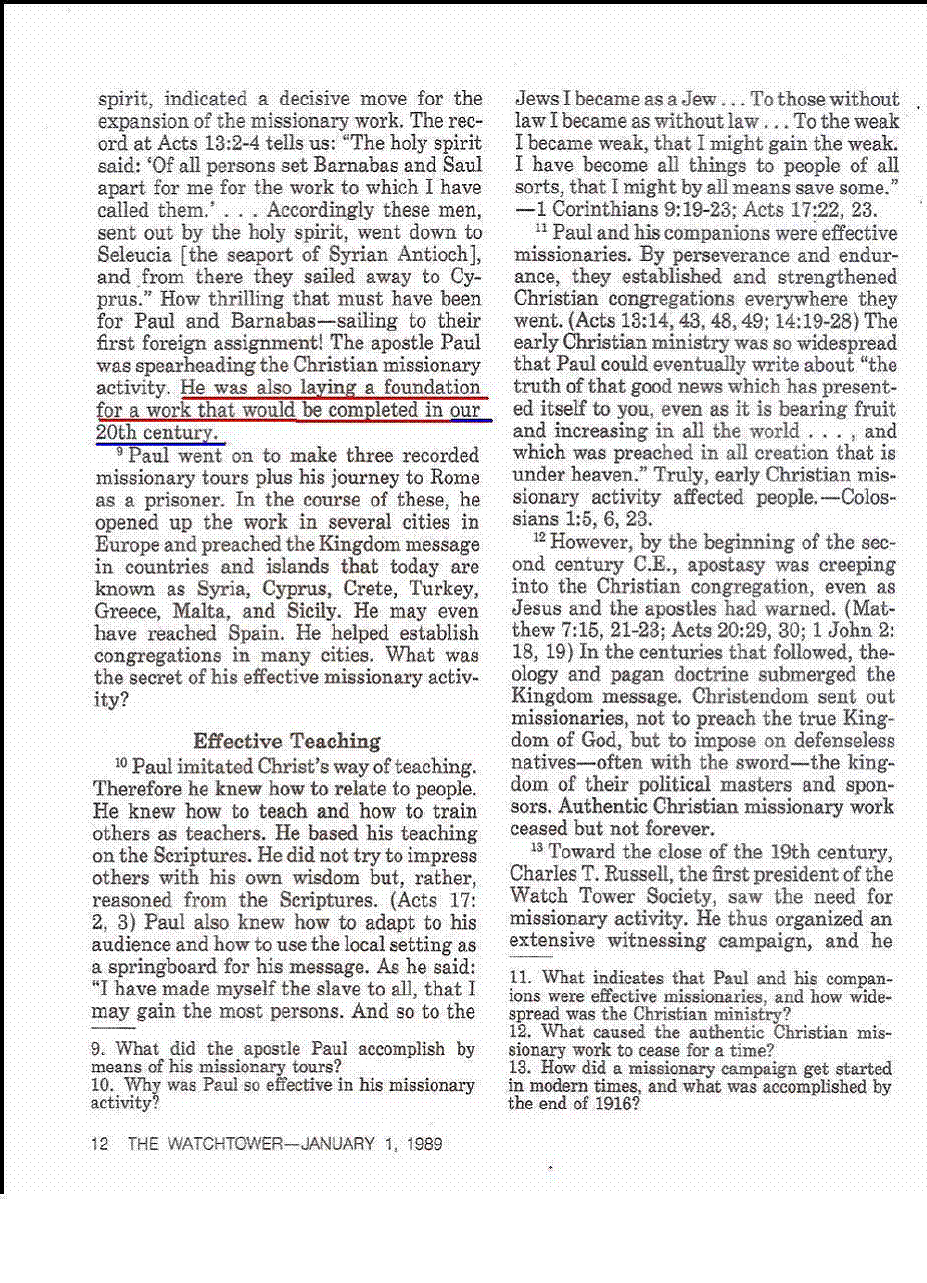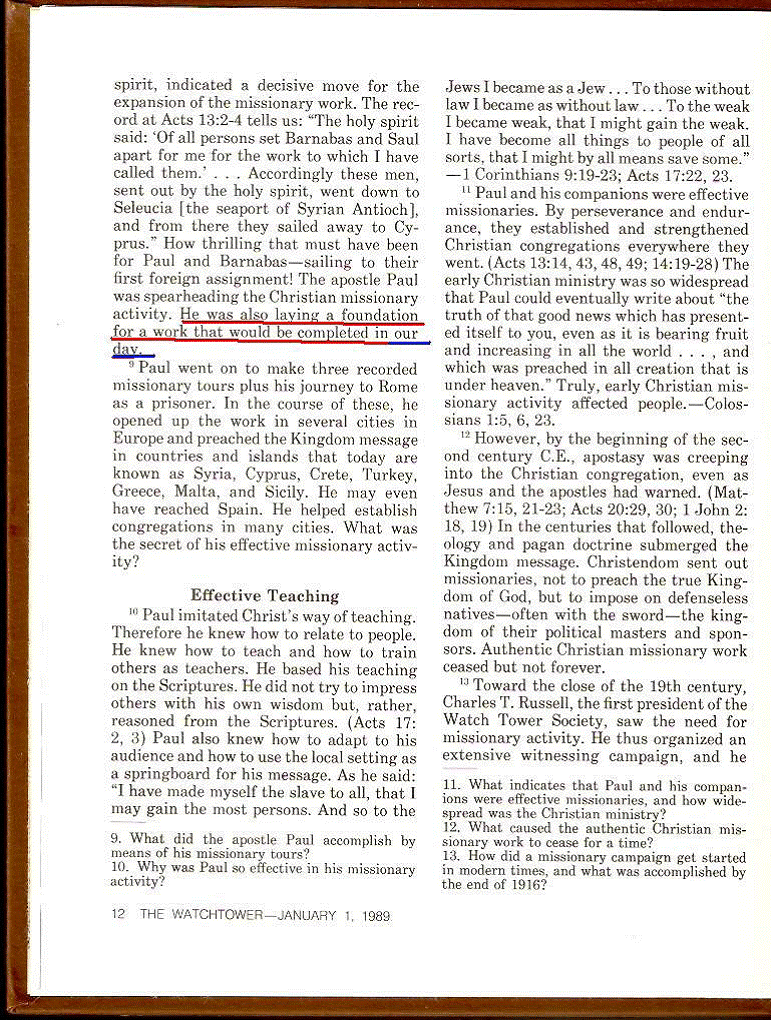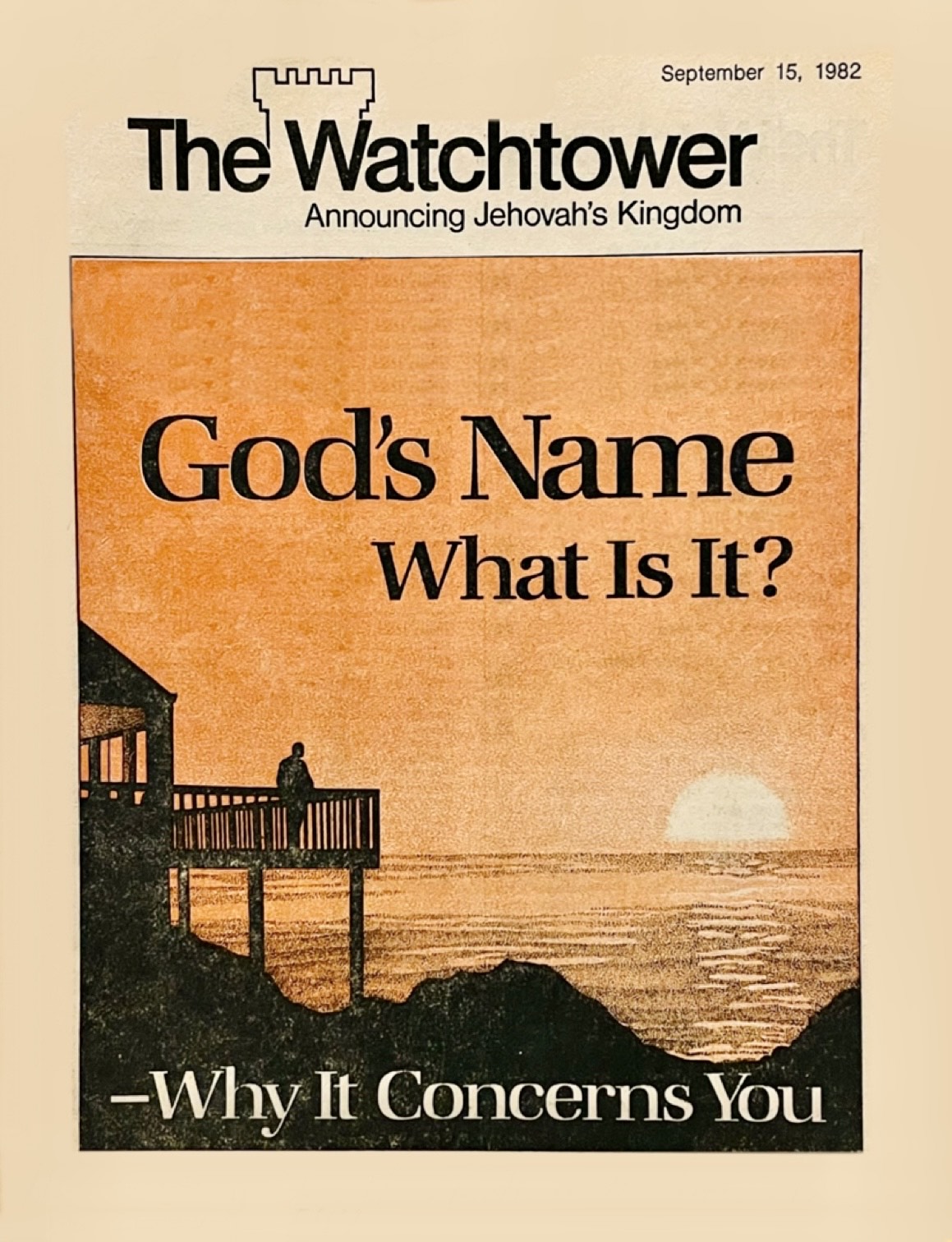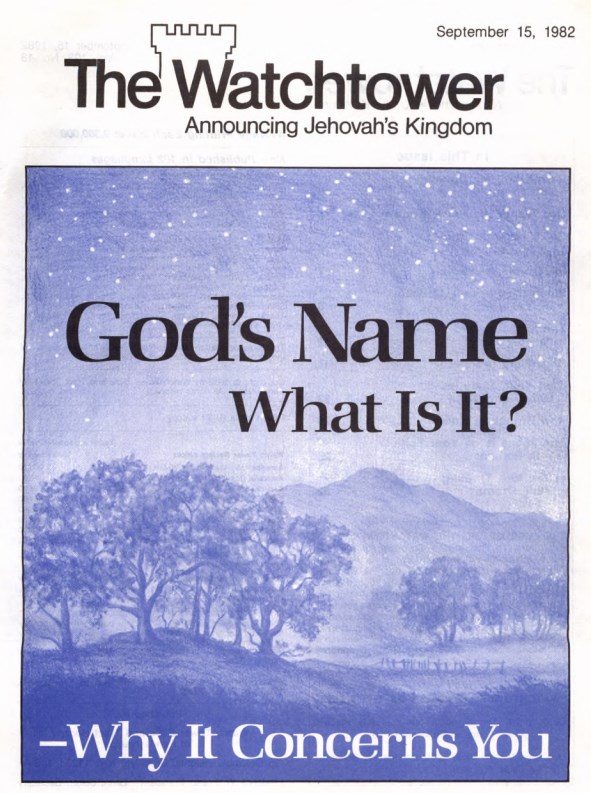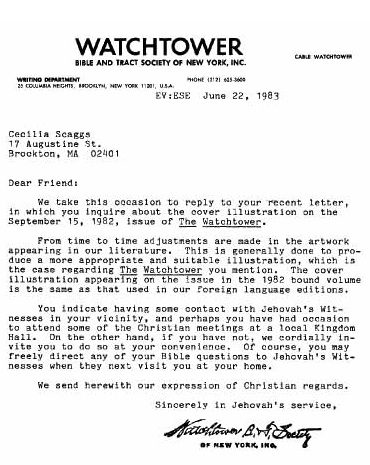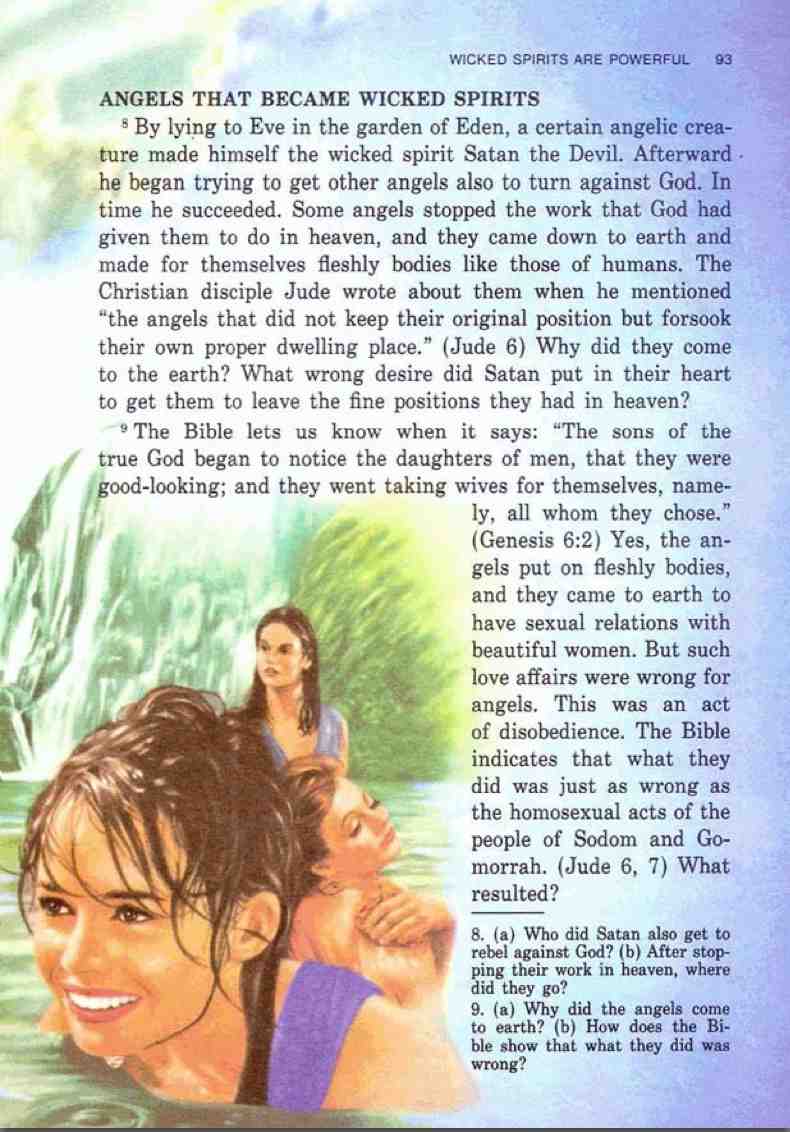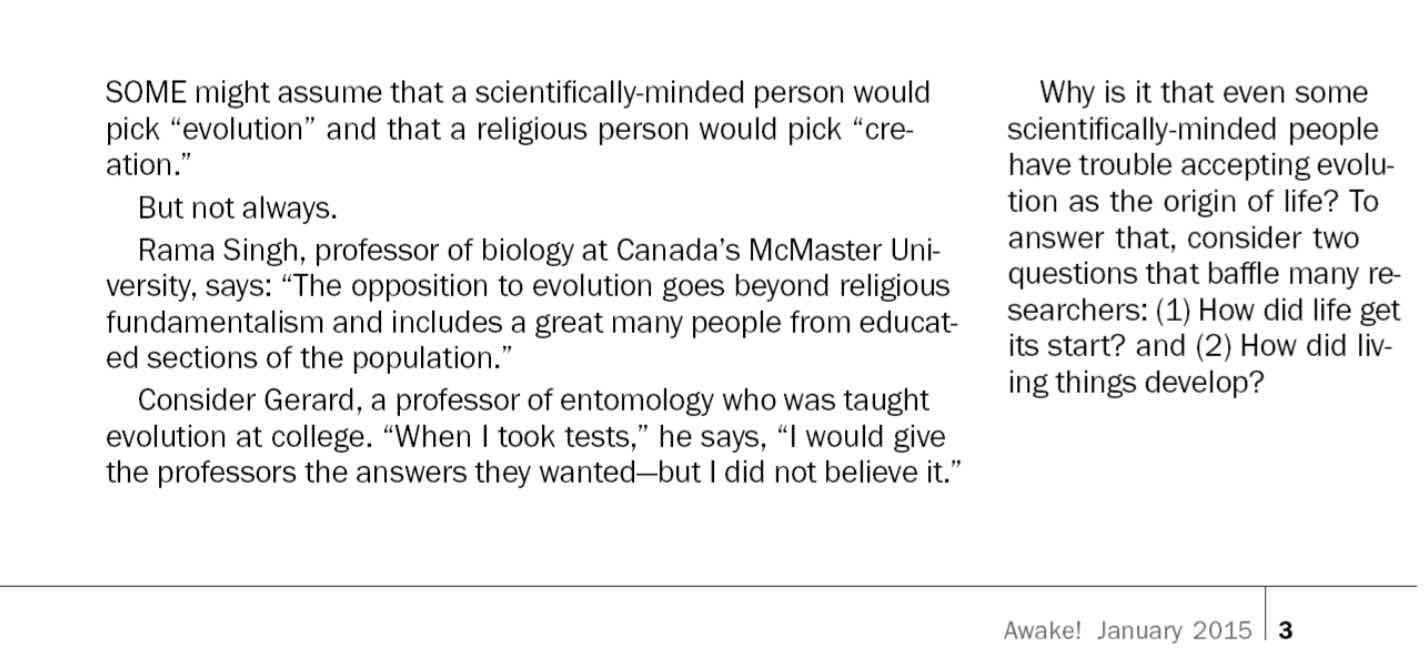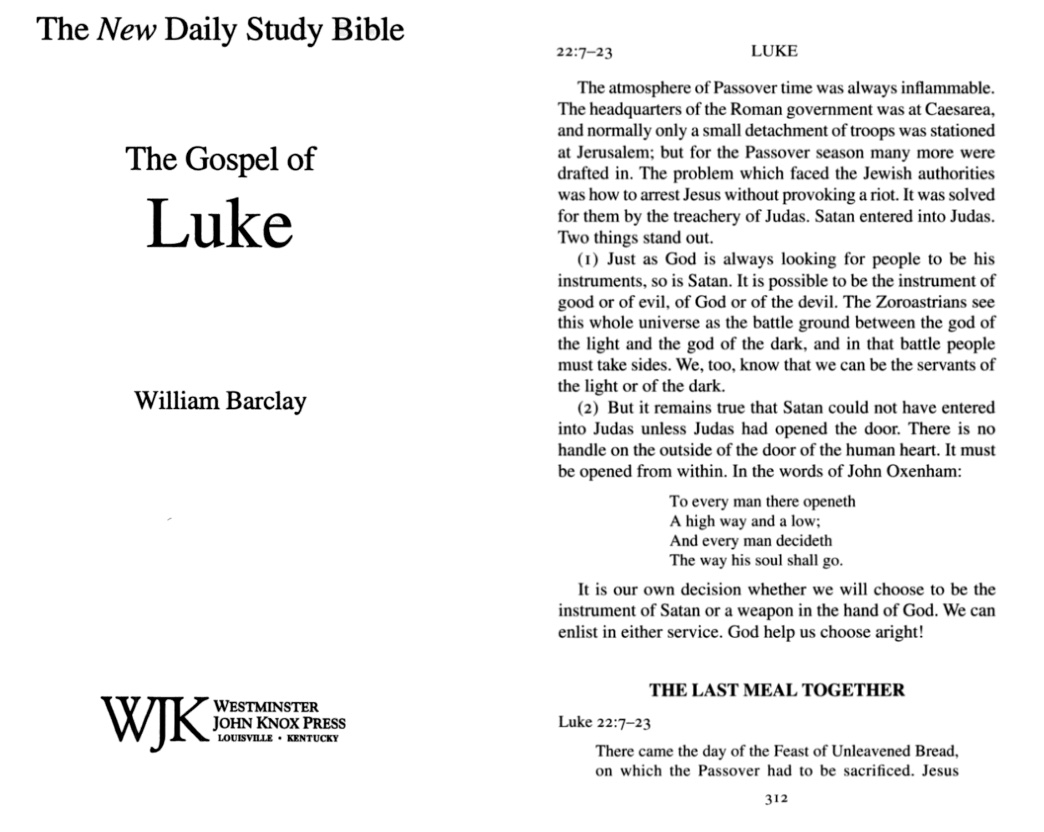home > watchtower scandal > misquotes
Misquotes, Deception and Lies
Jehovah’s Witnesses are told to have complete trust in the information the Governing Body provides them. Examples of numerous misquotes are included in this article, showing that such trust is not warranted.
Jehovah’s Witnesses are utterly convinced that their church’s leadership - the Governing Body - is both trustworthy and unquestionable. They are assured that the information they are provided is well researched, accurate and truthful. Under the heading “Tracing All Things With Accuracy” the 2011 Yearbook states:
Table of Contents
Lying
- Jehovah in the New Testament
- 1914 Quotes
- 1925 - Millions Now Living Will Never Die
- Naos
- Worship Jesus
- Russell's Biography
- 20th Century
- Death refusing Blood Transfusions
- Plagiarism
- Baptism
- Blame Members
- Downplay Defection
- African Watchtower Story
- War
- Splinter Groups
- Light Gets Brighter
- Vaccinations
Mis-quoting Sources
- Critical Thinking
- Last Days
- Blood Transfusions
- 607 B.C.E.
- Education
- Cross
- Trinity Brochure
- Creation Book
- Misquoted Scriptures
- The Wedding Ring
Rhetorical Fallacies
“In summary, the Writing Department insists on using only material that is accurate and truthful, even regarding seemingly insignificant details. As a result, “the faithful and discreet slave” can consistently supply spiritual food that brings honor to “the God of truth,” Jehovah.” (p.13)
Witnesses are told to put aside personal opinion regarding Scriptures, but rather have complete confidence in the leaders, as even Jehovah trusts them.
“[A mature Christian] does not advocate or insist on personal opinions or harbor private ideas when it comes to Bible understanding. Rather, he has complete confidence in the truth as it is revealed by Jehovah God through his Son, Jesus Christ, and "the faithful and discreet slave.” Watchtower 2001 Aug 1 p.14
“Since Jehovah God and Jesus Christ completely trust the faithful and discreet slave, should we not do the same?” Watchtower 2009 Feb 15 p.27
“We are determined to be loyal to Jehovah and to his organization. This organization has never disappointed us and always gives us an abundance of pure waters of truth from God’s Word.” Watchtower 2011 Jul 15 p.12 Simplified Edition
External research is not recommended, as the Watchtower supplies all the information required.
“In Jehovah's organization it is not necessary to spend a lot of time and energy in research, for there are brothers in the organization who are assigned to that very thing, …” Watchtower 1967 Jun 1 p.338
“Thus, “the faithful and discreet slave” does not endorse any literature, meetings or Web sites that are not produced or organized under its oversight. … For those who wish to do extra Bible study and research, we recommend that they explore “Insight on the Scriptures…”.” Kingdom Ministry Sep 2007 p.3
With such trust, Witnesses become impervious to the manner in which misinformation is presented. There are many ways of presenting information to mislead others, including total dishonesty, incorrect information, misrepresenting a person's position, misquotes, withholding information, use of ambiguous language and rhetorical fallacies. This article has specific examples of each from within the Watchtower.
Lying
The Name Jehovah in the New Testament
Watchtower asserts the Bible is uncorrupted and without omissions.
"Bible copyists, of course, made mistakes. But none of those mistakes corrupted the Bible. ... So, has the Bible been corrupted. Emphatically, no!" Watchtower 2017 no.6 p.14
"No striking or fundamental variation is shown either in the Old or the New Testament. There are no important omissions or additions of passages, and no variations which affect vital facts or doctrines." Reasoning from the Scriptures p.64
In contradiction to this statement, Watchtower alleges the word Jehovah was removed from the New Testament during the second century, and no known manuscripts have been found with Jehovah in it.
“When apostate Christians made copies of the Christian Greek Scriptures, they evidently took Jehovah’s personal name out of the text and substituted Ky′ri·os, the Greek word for “Lord."" Watchtower 2010 Jul 1 pp.6-7
"no ancient Greek manuscript that we possess today of the books of Matthew to Revelation contains God's name in full." The Divine Name that will Endure Forever p.23
Despite confessing the name Jehovah has never been found in any ancient Greek manuscripts, the New World Translation adds the word Jehovah over 200 times to the New Testament. This has signficant doctrinal implications regarding Jesus and Jehovah. Watchtower lies when saying they agree there are not important ommissions in the ancient Bible manuscripts, and are equally dishonest in their justification of where they chose to insert the word Jehovah - See Jehovah in the New Testament.
1914 Quotes
The Watchtower has regularly lied about what it said prior to 1914, claiming it correctly predicted the occurrences of 1914, and has held to consistent teachings regarding that date.
Until the 1930's, the Watchtower taught that:
- The time of the end commenced 1799
- Jesus presence commenced 1874
- Jesus' heavenly rule in 1878
"There are two important here that we must not confuse, but clearly differentiate, namely, the beginning of "the time of the end" and of "the presence of the Lord". "The time of the end" embraces a period from A.D. 1799, as above indicated, to the time of the complete overthrow of Satan's empire and the establishment of the kingdom of the Messiah. The time of the Lord's presence dates from 1874, as above stated. The latter period is within the first named, of course, and at the latter part of the period known as "the time of the end"." The Harp of God (1921) p.231
"The year A.D. 1878 … clearly marks the time for the actual assuming of power as King of kings, by our present, spiritual, invisible Lord …" Studies in the Scriptures - The Time is At Hand (1911 ed) p.239
Yet it is now stated that the Watchtower "anticipated" Jesus would receive power in 1914.
"By linking the "seven times" of Daniel 4:25 with "the times of the Gentiles", they anticipated that Christ would receive Kingdom power in 1914." Watchtower 1998 Sep 15 p.15
"For over thirty years before that date and for half a century since, Jehovah's witnesses have pointed to the year 1914 as the time for the end of "the appointed times of the nations" and the time in which Christ would begin his Kingdom rule. (Luke 21:24)" Watchtower 1966 Feb 15 p.103
Likewise, it was originally predicted that the end was to occur in 1914, yet now it is wrongfully stated that 1914 was the "start" of the end.
"But bear in mind that the end of 1914 is not the date for the beginning, but for the end of the time of trouble." Zion's Watch Tower 1894 Jul 15 p.226
"Jehovah's witnesses pointed to the year 1914, decades in advance, as marking the start of "the conclusion of the system of things." Awake! 1973 Jan 22 p.8
1914 was to be the start of the earthly resurrection.
"The beginning of the earthly phase of the Kingdom in the end of A.D. 1914 will, we understand, consist wholly of the resurrected holy ones of olden time-from John the Baptizer back to Abel;-"Abraham, Isaac, Jacob and all the holy prophets."" Studies In the Scriptures - The Day of Vengeance (1897) p.625
Now they claim their calculations were true.
"He had correctly linked the Gentile Times with the "seven times" mentioned in the book of Daniel. (Dan. 4:16, 23, 25, 32) True to such calculations, 1914 did mark the end of those times and the birth of God's kingdom in heaven with Christ Jesus as king. Just think of it! Jehovah granted his people that knowledge nearly four decades before those times expired." Yearbook 1975 p.37
"Decades before 1914, Jehovah's worshippers declared to the nations that the end of "the appointed times of the nations" would come in that year and that the world would enter into an unequaled period of trouble." Watchtower 2013 Feb 15 p.18
It was not declared that the world would enter the time of trouble in 1914, as the time of trouble was said to have started in 1874.
“…, and the time of trouble, or “day of wrath” which began October 1874 and will end October 1914;… “ Studies in the Scriptures - The Day of Vengeance p.604
Whilst, it is strictly correct that Russell declared the Gentile Times, or "appointed times of the nations", would end in 1914, these statements hide that nothing expected for the end of the Gentile Times came to pass.
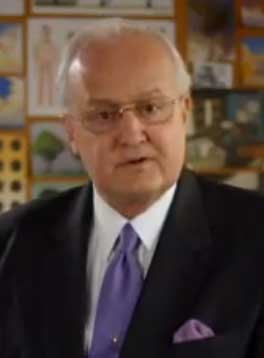
For more information see Failed 1914 Predictions.
In the 2010 DVD Faith In Action, Anthony Morris, speaking of Russell and the Bible Students, makes the statement:
"The fact that they were able to pinpoint that year [1914] is just phenomenal."
Russell did not originate the interpretation that the Seven Times pinpointed 1914 as the end of the Gentile times. Russell took this teaching from the Second Adventist movement. In 1823, John Aquila Brown published in The Even-Tide that the "seven times" of Daniel 4 were prophetic of 2,520 years, running from the beginning of Nebuchadnezzar's reign in 604 B.C. to 1917 A.D. Barbour later adjusted this to 1914. In 1875, The Herald of the Morning, edited by Barbour, Cogswell and Paton, stated;
"I believe that though the gospel dispensation will end in 1878, the Jews will not be restored to Palestille, until 1881; and that the "times of the Gentiles," viz. their seven prophetic, times, of 2520, or twice 1260 years, which began where God gave all, into the hands of Nebuchadnezzar, 606 B.C.; do not end until A.D. 1914; or 40 years from this." The Herald of the Morning 1875 Sep
Impressed with Barbour's prophetic doctrine, Russell joined with him in 1876 and started to promote Barbour's date doctrine, including 1874, 1878 and 1914.
1925 - Millions Now Living Will Never Die
Watchtower falsely predicted that Abraham, Isaac and Jacob were going to be resurrected in 1925. In 1980, the Yearbook quotes from a 1926 Watchtower justifying the failure as just “an expressed opinion.” First, that statement is inaccurate, as from 1918 to 1925 the core Watchtower message was that the new system would commence in 1925, with a series of lectures and the booklet entitled “Millions now Living Will Never Die.” So effectual was the message, that after the predictions of 1925 failed to eventuate, memorial attendance dropped from 90,434 in 1925 to only 17,380 in 1928. (See Watchtower 1960 May 1 p.282 and Jehovah's Witnesses in the Divine Purpose p.313)
Second, the Yearbook only half quotes the statement, putting a full stop in place of a semicolon. The full quote showed that the return of Abraham and the other Ancients was still being promoted with the phrase, “it is still shortly after 1925.”
| Original Quote | 1980 Quote |
|
“It was stated in the "Millions" book that we might reasonably expect them to return shortly after 1925, but this was merely an expressed opinion; besides it is still shortly after 1925. There is no good reason why we should expect the ancient worthies to return until the church is complete and the work of the church on earth is done." Watchtower 1926 p.196 |
"Indicative of this testing was the question meeting held by Brother Rutherford during the Basel, Switzerland, assembly, which took place May 1-3, 1926. The report on this convention stated:
Question: Have the ancient worthies returned? Answer: Certainly they have not returned. No one has seen them, and it would be foolish to make such an announcement. It was stated in the "Millions" book that we might reasonably expect them to return shortly after 1925, but this was merely an expressed opinion." Yearbook 1980 p.62 |
In February 1918, Rutherford gave a public lecture that "The World Has Ended - Millions Now Living May Never Die!" In March 1918, the title was changed to the more compelling “The World Has Ended — Millions Now Living Will Never Die”. When discussing the 1918 Mar 31 lecture, the Watchtower 2010 Feb 15 page 16 uses the word "may" instead of "will", despite the scanned image showing the word "will". Not only is using the word "may" deceptive, it covers over the absolute conviction that Rutherford was implanting in his followers that the new system would arrive in 1925.
Watchtower 2010 Feb 15 p.16
Naos
Revelation 7:9-17 and 19:1 show that the great crowd are in heaven. However, the Watchtower is determined to show they will be on earth. Since Revelation 7:15 states that the great crowd are in the temple sanctuary (naos), where only the priests could enter, the Watchtower resorts to lying in order to convince followers that naos could include the outer courtyards.
"For example, in the Bible account of where Jesus Christ drove the money changers and merchantmen out of Herod's temple, the original Greek word used is na.os'." Watchtower 1980 Aug 15 p.15
This is a lie. None of the Scriptures discussing where Jesus drove the money changers from use the word naos, they use the word hieron, which includes the outer courtyards. See John 2:14-15, Matthew 21:12 and Mark 11:15 in the The Kingdom Interlinear Translation of the Greek Scriptures.
Worship Jesus
Jehovah’s Witnesses must not worship Jesus. Yet this has only been the case since 1954, as originally Witnesses worshipped both Jehovah and Jesus. Interestingly, the Watchtower Charter stated Jesus was to be worshipped up until it was finally amended in 1999. For 45 years, Witnesses were counselled against worshipping Jesus, even though in the Charter to do so was stated as the express reason for the existence of the Watchtower Society. To deal with this discrepancy, the Watchtower resorted to misquoting the Charter.
The Charter stated:
"for public Christian worship of Almighty God and Christ Jesus; to arrange for”
The Yearbook of 1969 p.50 leaves the words "and Christ Jesus" out, replacing them with dots.
"for public Christian worship of Almighty God … ; to arrange for”
The Watchtower 1971 p.760 replaces the word “and” with “through”, to significantly hide and change the true meaning of the sentence.
"for public Christian worship of Almighty God [through] Christ Jesus; to arrange for" Watchtower 1971 Dec 15 p.760
The 1993 Proclaimers book, which is a history of the Watchtower Society, fails to even mention what is in this important document.
Russell's Biography
It has been written that there was never a biography about Russell, so as not to take glory from Jehovah.
"But, is it true you have never published a biography of Pastor Russell? …
That's right. Jehovah's witnesses admire the qualities he possessed as a man, but were we to give the honor and credit to Pastor Russell, we would be saying that the works and success were his; but Jehovah's witnesses believe it is God's spirit that guides and directs his people." Jehovah's Witnesses in the Divine Purpose (1959) p.63
This is not true, as the Proclaimers book tells us that there was a biography.
"A brief biography of Russell along with his will and testament was published in The Watch Tower of December 1, 1916, as well as in subsequent editions of the first volume of Studies in the Scriptures." Jehovah's Witnesses - Proclaimers of God's Kingdom p.64
20th Century
The Watchtower re-wrote history when changing what it must have recognised would become an embarrassing failure, when changing the wording of the original printed magazine to what it included in the bound volume. The Watchtower 1989 Jan 1 p.12 indicated that Armageddon would arrive within the twentieth century, stating :
"He was laying a foundation for a work that would be completed in our 20th century."
When printed in the 1989 Watchtower bound volume and the subsequent Watchtower CD library, this was changed from "in our 20th century" to "in our day."
This is ingenious, as it provided Witnesses reading the magazine with false hope and motivation, yet in the future those researching would not be able to say the Watchtower was wrong. Printed prior to the mainstream internet, it could never have been expected that more than a few would ever become aware of the switch.
Death refusing Blood Transfusions
Watchtower has claimed it is a lie that numerous children die refusing blood transfusions, despite 4 years earlier proudly admitting that Jehovah's Witness children do die standing up for the Watchtower stance against blood.
"Jehovah's Witnesses have been targets of false accusations - barefaced lies and twisted presentations of their beliefs... The accusation that numerous children of Jehovah's Witnesses die each year as a result of refusing blood transfusions is totally unfounded." Watchtower 1998 December 1 p.14
"In former times thousands of youths died for putting God first. They are still doing it, only today the drama is played out in hospitals and courtrooms, with blood transfusions the issue." Awake! 1994 May 22 p.2
Plagiarism
Plagiarism carries inherent risks, such as copying inaccurate information, or illegally violating copyright.
The majority of Watchtower doctrine comes from other sources. For instance, teachings of Russell, including 1914, were from the nineteenth century Adventist movement. Rutherford's claim that Jesus did not die on a cross was being promoted by some Protestant Preachers, such as E.W. Bullinger. Watchtower books regarding evolution draw heavily on Creationist books, including their misrepresentation of science journals.
Plagurised images have landed Watchtower in trouble. According to one Bethel illustrator, it was common for some artists to source and copy pictures from magazines.
One example was the cover of the Watchtower 1982 Sep 15. The following Johnny Walker advertisement appeared in magazines such as the U.S. News and World Report 29 Jun 1981 ans Reader’s Digest, Sep 1982 page 37. A plagiarised version appeared on the cover of the Watchtower 1982 Sep 15.
Somerset Importers, the distributor of Johnny Walker, contacted Watchtower regarding this violation of copyright, and it was removed from future printings, including in foreign editions and the Bound volume.
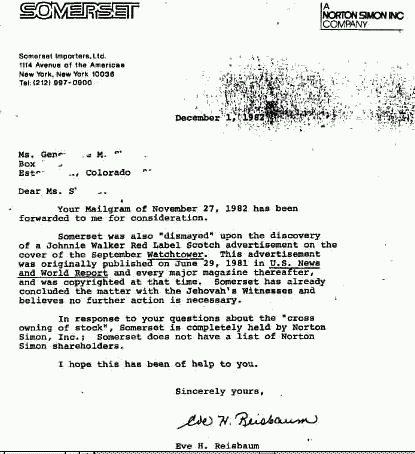
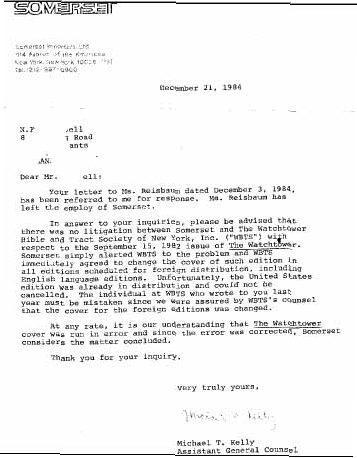
The new cover was changed to a grove of trees against a mountain.
Not only did Watchtower break copyright, but they were less than forthright with readers enquiring about the change, replying it was for a "more appropriate and suitable illustration."
Such enquirers must have been left wondering what was inappropriate about the sunset.
Another example appears on page 93 of the book You Can Live Forever in Paradise on Earth. I remember the picture and feeling I understood the temptation the angels felt looking down upon such a beautiful woman. I did not know at the time that the picture was a real person, Pascale Petit, who appeared in Playboy November 1963 and the European sex comedy Frau Wirtin hat auch einen Grafen. The Live Forever book potentially infringed copyright, as the image is a copy of an image that appeared on the cover of the 23rd July 1960 Today magazine, and the 13th August 1961 German magazine Stern.


Illustrations in My Book of Bible Stories (1978), stories 3 and 17, resemble images from The Bible Story by Arthur S. Maxwell (Review and Herald Publishing Association 1955).




Baptism
What Does the Bible Really Teach (2005) makes the comment;
"… you have made a dedication to Jehovah God himself, not to a work, a cause, other humans, or an organization. Your dedication and baptism are the beginning or a very close friendship with God-an intimate relationship with him." p.183
Jehovah's Witnesses make a dedication and baptism to an organisation. The second baptism question is;
"Do you understand that your dedication and baptism identify you as one of Jehovah's Witnesses in association with God's spirit-directed organization?" Watchtower 1985 Jun 1 p.30
The Watchtower used to abide by the Biblical procedure outlined at Matthew 28:19 of baptising in the name of the Father, Son and holy spirit, but in 1985 holy spirit was replaced with God's spirit-directed organization, as discussed at Changing Baptism Arrangement.
Blaming Members
The Watchtower made definitive statements that this worldly system would end in 1914 and 1925 and strong implications regarding 1975. Yet following the failure of these predictions, it claimed the fault was that of faithful members, shirking admission of its responsibility in setting these expectations.
Regarding 1914:
"It seems to be a weakness of many Bible Students that if they locate a future date in the Bible, immediately they center as many prophecies upon that date as possible. This has been the cause of many siftings in the past. As far as we recall, all the dates foreseen were correct. The difficulty was that the friends inflated their imaginations beyond reason; and that when their imaginations burst asunder, they were inclined to throw away everything. ... Many can remember how "absolutely sure" some were about 1914. No doubt the Lord was pleased with the zeal manifested by his servants; but did they have a Scriptural basis for all they expected to come to pass that year? ” Watch Tower 1925 Feb 15 p.57
“There is no doubt that many throughout this period were overzealous in their statements as to what could be expected. Some read into the Watch Tower statements that were never intended.” Jehovah's Witnesses in the Divine Purpose p.52
Regarding 1925:
“Some anticipated that the work would end in 1925, but the Lord did not state so." Watch Tower 1926 p.232
Regarding 1975:
“If anyone has been disappointed through not following this line of thought, he should now concentrate on adjusting his viewpoint, seeing that it was not the word of God that failed or deceived him and brought disappointment, but that his own understanding was based on wrong premises.” Watchtower 1976 Jul 15 p.441
Downplay Defection
When describing a tragic period of persecution in Liberia in 1963, a 1982 Watchtower claimed only a few compromised their faith, with the majority maintaining integrity.
"While a few did give way and compromise because of fear, the great majority maintained integrity." Watchtower 1982 Apr 15 p.25
However, the 1977 Yearbook had shown that in fact the majority of Jehovah's Witnesses compromised their faith. After being caught out by readers, Watchtower was forced to admit:
"The statement in The Watchtower for April 15, 1982, is in error. Actually, according to the Yearbook of 1977, pages 176 and 178, there were about 100 Liberian Witnesses who went through the Gbarnga persecution maintaining integrity, while approximately 200 compromised their faith." Watchtower 1982 Jul 15 p.31

African Watchtower Story
The Yearbook 1976 pp.69-74 discusses Joseph Booth and Elliot Kenan Kamwana, the Watchtower's first representatives in Nyasaland, Africa in the early 1900's. Booth was paid by Watchtower as a missionary and in 1909 the Watchtower contained an article titled "Good Tidings Spreading in Africa", which discussed the work of Kamwana in Nyassalan.
"Hence, the Society, for a time, undertook Booth's expenses as its missionary to those peoples [in Nyasaland] with whom he was acquainted." Yearbook 1976 p.71
"They are overjoyed at having the same message brought here which they have heard was being proclaimed up in their home country, Nyassaland, by Brother Elliott Kamwana. … Brother Elliot Kamwana was arrested and deported by the government at the instigation of the Calvinistic Scotch missionaries of Bandwe, Lake Nyasa, who were greatly surprised that their work of years could be so quickly lifted to the higher plane of our teaching. … Brother Kamwana baptized 9,126 in past year." Watch Tower 1909 Jul 1 p.195
The followers that Kamwana managed to convert became known as members of "The Watchtower Movement." However, many of the followers continued with pagan practices and polygamy, and were involved in a later uprising. In 1948, the Watchtower released a booklet called The Watchtower Story in an attempt to distance itself from this group. The booklet dishonestly said:
"It should be particularly noted that the "native rising" took place in 1915. The Watch Tower Bible And Tract Society had no resident representative in Nyasaland or the Rhodesias prior to 1925." The Watchtower Story p.6
Click to download
War
The Watchtower makes the grossly exaggerated statement:
"Who are no part of the world and learn war no more? Again, the historical record of the 20th century testifies: only Jehovah's Witnesses." Watchtower 1992 Apr 1 p.12
There are a number of pacifist and neutral religions that do not go to war, such as Quakers, Christadelphians, Worldwide Church of God and Anabaptists. Some Pacifists go further than Witnesses in their avoidance of war by even refusing to pay the "War Tax" component of income tax in the United States. This is discussed in detail at Jehovah's Witnesses and War.
Splinter Groups
“Third, unlike the Protestant movement, which has splintered into hundreds of denominations, Jehovah’s Witnesses have maintained a united global brotherhood.” Watchtower 2009 Nov 1 p.19
Surely, Jehovah's Witnesses are aware of enough of their history to know of the Russellites and Bible Student groups that broke away, particularly following Russell's death, though these groups would claim Rutherford broke away from the true religion as set up by Russell.
It may be said that the quote was referring to Jehovah's Witnesses specifically since the official name was chosen in 1931, rather than the Jehovah's Witnesses that have existed since Adam (Jehovah's Witnesses in the Divine Purpose p.8), or possibly when the Governing Body is said to have been chosen in 1919, but even that is not true. New sects have been constantly forming. In Romania, one group of Witnesses spent decades isolated during communism, with access primarily to Rutherford's works. On gaining freedom, they were offended at the many doctrinal changes in recent Watchtower publications, and set up The True Faith Jehovah's Witnesses. Since the Internet, there have been many small splinter groups starting.
Some Breakaway sects with active websites, as of 12 Feb 2013 include:
- The True Faith Jehovah's Witnesses
- Bible Fellowship Union
- God's Kingdom Society
- Christian Witnesses
- The Lord's Witnesses
- Phoenix Bible Students
- Chicago Bible Students
- Baltimore Bible Students
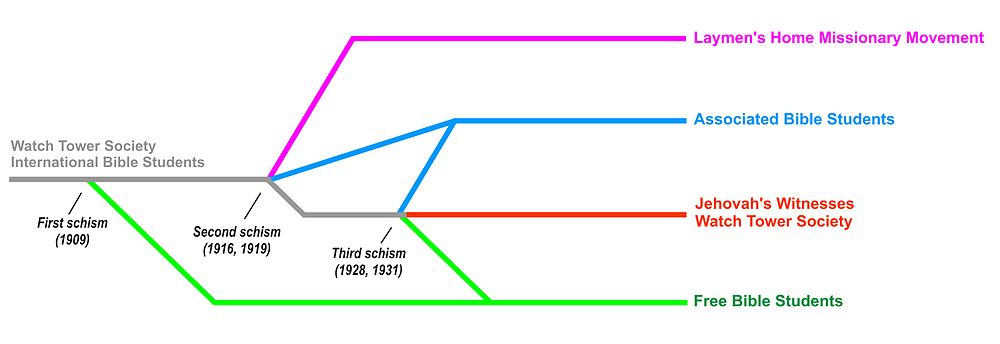
Light gets Brighter

In order to justify that the Watchtower teaches truth, despite constant doctrinal changes, the idea of the “light gets brighter” is invoked. New doctrine does not contradict but clarifies old doctrine. The progression of doctrine is described as tacking, moving from side to side but ever forward.
“Of course, such development of understanding, involving “tacking” as it were, has often served as a test of loyalty for those associated with the “faithful and discreet slave.” However, progress is being made continually toward fuller appreciation of the “good news” and all that it means.” Watchtower 1981 Dec 1 p.27
This is not the case in many doctrinal changes, where the doctrine has gone back and forth between two or more interpretations. Recent examples regard the “generation” and “faithful and discreet slave.” In such cases, the new doctrine is presented as new light, without revealing that they are going back to a previous teaching.
For instance, the Watchtower used to teach that the Superior Authorities of Romans 13:1 were Governments. In 1929, this was changed to being Jehovah and Jesus. In 1962, this went back to being Governments. Yet when discussing this topic, Watchtower publications, such as Watchtower 1990 Nov 1 p.11 and Jehovah's Witnesses - Proclaimers of God's Kingdom pp.146-147, present the 1962 change as “progressive” or “increased” light, failing to mention that they were returning to “old light.”
Vaccinations
When vaccinations first became popular, the Golden Age (now Awake!) claimed they were "barbarous" and credited to "the devil." (Golden Age 1921 Oct 12 p.17) A string of articles wrote against them, with the Golden Age 1931, Feb 4 issue devoting 10 pages to why vaccinations were not for Christians.
"Vaccination is a direct violation of the everlasting covenant that God made with Noah after the flood." Golden Age 1931 Feb 4 p.293
This led to great difficult for Jehovah's Witness children as schools started to make them a mandatory requirement, along with obtaining visas for travel. After preaching against vaccinations for 30 years, in 1952 Watchtower reversed its stance, specifically stating it would not be drawn into any legal responsibility.
"The matter of vaccination is one for the individual that has to face it to decide for himself... And our Society cannot afford to be drawn into the affair legally or take the responsibility for the way the case turns out." Watchtower 1952 Dec 15 p.764
In 1993, Watchtower dishonestly claimed it has held a consistent position on vaccinations.
"Previous articles in this journal and its companion, The Watchtower, have presented a consistent position: It would be up to the Bible-trained conscience of the individual Christian as to whether he would accept [vaccinations] for himself and his family." Awake! 1993 Aug 8 p.25
Who knows what harm Jehovah's Witness children suffered through preventable diseases, yet rather than an apology, Watchtower denies the period of its history.
Mis-quoting Sources
Critical Thinking
In the article "Winning the Battle for Your Mind," Watchtower 2017 July page 28 includes a quote regarding propaganda:
"Therefore, it is likely to be most effective if people ... are discouraged from thinking critically."
What has been cut out and replaced by ellipses (...)?
"Therefore, it is likely to be most effective if people do not have access to multiple sources of information and if they are discouraged from thinking critically. Michael Balfour has suggested that the "best touchstone for distinguishing propaganda from science is whether a plurality of sources of information and of interpretations is being discouraged or fostered. " Media and Society In the 21st Century: A Historical Introduction p.78 or Media and Society In the 21st Century: A Historical Introduction 2009 p.83 depending on edition, Lyn Gorman, David McLean
Watchtower's misuse of ellipses is very important when considered in light of the Watchtower article, which says to trust a single source of information, follow the organisation regardless of how imperfect and dismiss alternative information regardless of how plausible.
"... you—like any other soldier in the heat of battle—need a source of trustworthy, reliable information to prevent the enemy from playing tricks with your mind. Jehovah has provided this. In the pages of the Bible, you can find all you need to combat Satan’s propaganda." Watchtower 2017 Jul p.28
"Be determined to stick to Jehovah’s organization and loyally support the leadership he provides—no matter what imperfections may surface. (1 Thess. 5:12, 13) Do not be “quickly shaken from your reason” when faced with what appear to be damaging attacks by apostates or other such deceivers of the mind—however plausible their charges may seem." Watchtower 2017 Jul p.30
Last Days
The Watchtower quotes the Gazette for support that in 1914 War War 1 changed the world for the worse. Taken in context the article says something quite different.
“News columnists recently commented on the end of World War I 60 years ago. Gwynne Dyer of the Montreal “Gazette” wrote: “World War I—simply The Great War to its survivors—remains the watershed of modern history in men’s minds. Before 1914, the figures in the fading photographs live in another world . . . marked by a peculiar innocence. . . . It was the period before 1914 that was the island in time, when men could believe that progress was changing us as quickly as it was changing our machines. Then World War I tumbled us back into reality.” Watchtower 1979 Fe 15 p.13
Between these carefully chosen comments and the ellipses the Gazette includes the following paragraph.
"This is of course a hopelessly romantic view of the world we are idealizing the past, and over-dramatizing our own circumstances. The 20th century is certainly no worse than the 13th for mass slaughter, nor than the ancient empires for regimentation." Gazette 11 Nov 1976
Click here for a scan of the article.
Blood Transfusions
The Watchtower employs a range of methods to convince members that blood transfusions are unsafe. This is such an important topic, due to ongoing lives being lost, that it is recommended to consider the information at Blood Transfusions, and also Jehovah's Witnesses, Blood Transfusion, and the Tort of Misrepresentation by Kerry Louderback-Wood.
One outstanding misquote regards the risk of refusing a transfusion for renal transplantation. Not only is a full stop added, but the quote hides the context that shows a significant increase in death rate for Jehovah's Witness renal transplant patients with anaemia.
“The overall results suggest that renal transplantation can be safely and efficaciously applied to most Jehovah’s Witnesses.” How Can Blood Save Your Life? p.16
The full quote is:
"Jehovah Witnesses had an increased susceptibility to rejection episodes. The cumulative percentage of incidence of primary rejection episodes was 77 percent at three months in Jehovah’s Witnesses versus 44 percent at 21 months in the matched control group. The consequence of early allograft dysfunction from rejection was particularly detrimental to Jehovah’s Witness who developed severe anemia (hemoglobin (Hgb)* 4.5 per cent) – two early deaths occurred in the subgroup with this combination. The overall results suggest that renal transplantation can be safely and efficaciously applied to most Jehovah Witness patients but those with anemia who undergo early rejection episodes are a high-risk group relative to other transplant patients."
Misleading comments are made such as that erythropoietin (EPO) can help a patient "form replacement red cells very quickly”, “three to four times faster than normal.” (How Can Blood Save Your Life? p.15) A reader quite likely would think "very quickly" means hours or days, yet "EPO can take four or more weeks to begin to relieve some of the symptoms of anaemia." (myeloma.org.uk Erythropoietin Infosheet Oct 2011)
The information supplied in How Can Blood Save Your Life? also attempts to create unrealistic fear of the risks of blood transfusion. For instance, page 11 quotes from The New York Times July 18 1989 that "A panel of health officials … [all] answered no" to accepting blood from a person who tested positive for Lyme disease. What is not stated is that there have never been any "cases of Lyme disease … linked to blood transfusion …." (http://www.cdc.gov/lyme/transmission/ as of 22 Apr 2013)
607 B.C.E.
The year 607 B.C. is pivotal to Jehovah's Witnesses, as it is the foundation for calculating 1914 as the start of the Last Days. This topic is so detailed that it warrants its own discussion at 607 - 1914 - Last Days. Relevant to this article is that while the Watchtower says Jerusalem was destroyed in 607 B.C., virtually every other source, including encyclopaedias, historians and scholars, state that Jerusalem fell in either 587 B.C. or 586 B.C.
To arrive at the spurious date of 607 B.C., the Watchtower needs to re-work the dates for other significant events, also without any historical support. For this reason, the Watchtower has resorted to misrepresenting quotes to make it appear its date system is correct. For example, in the following quote the Insight Book inserts the year 624 B.C.E. as the accession year of Nebuchadnezzar. Though done correctly by use of [ ], the reader is left with the impression this date is supported by the original source.
"In this his accession year he returned to Hattu, and "in the month Shebat [January-February, 624 B.C.E.] he took the vast booty of Hattu to Babylon." (Assyrian and Babylonian Chronicles, by A. K. Grayson, 1975, p. 100)" Insight on the Scriptures - Volume 2 p.480
However, on checking Assyrian and Babylonian Chronicles, Grayson does not use the date of 624 B.C., but rather on page 19 gives the accession date as 605 B.C.
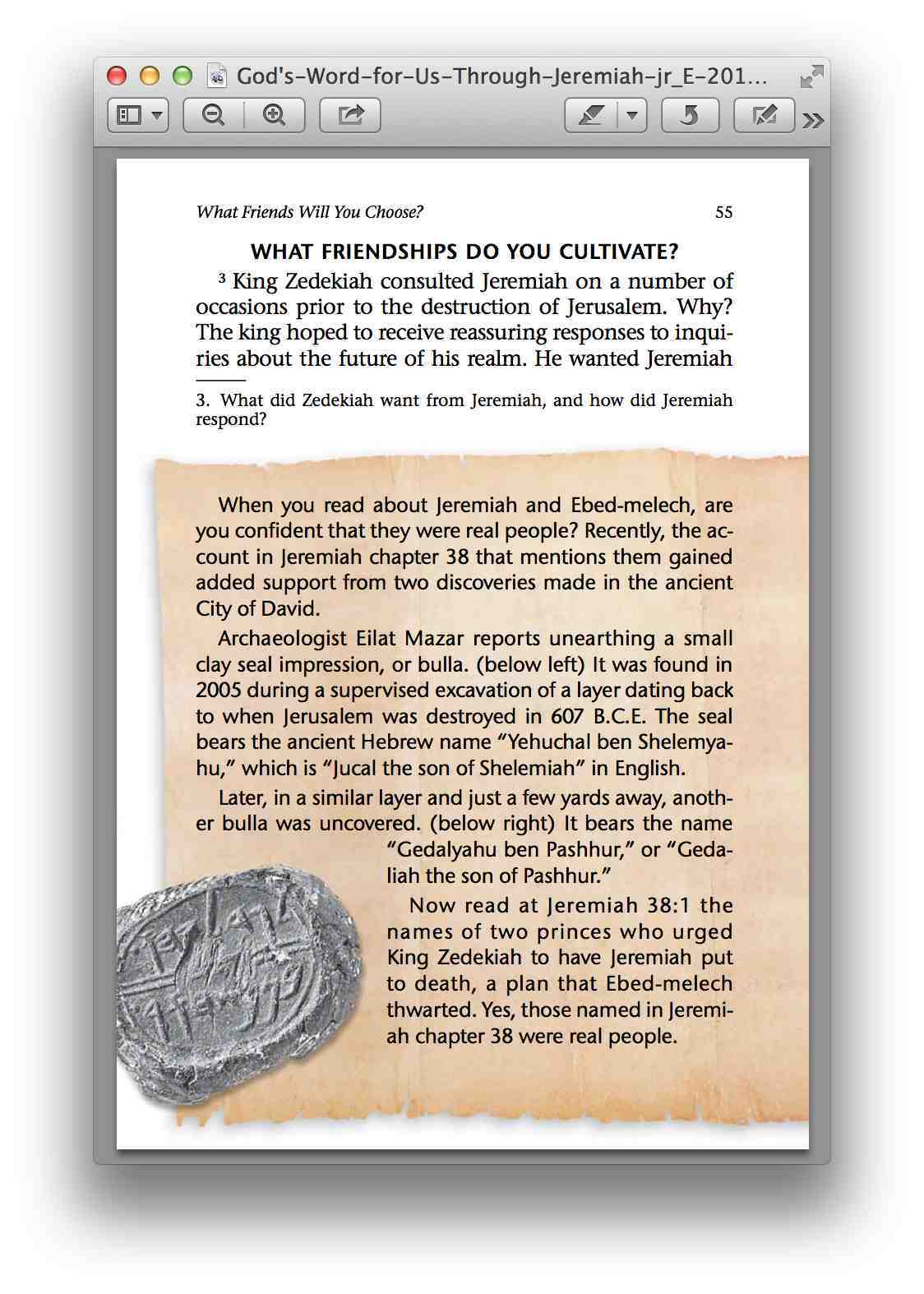
In the 2010 book God's Word for Us Through Jeremiah, a statement is made regarding a find by Eilat Mazar, supporting two Characters mentioned in Jeremiah.
"Archaeologist Eilat Mazar reports unearthing a small clay seal impression, or bulla. (below left) It was found in 2005 during a supervised excavation of a layer dating back to when Jerusalem was destroyed in 607 B.C.E." God's Word for Us Through Jeremiah p.55
The reader may get the impression that Eilat is supporting the year 607 B.C.E., whereas she presents that the destruction was in 587 B.C. (See articles at jpost.com and archaeology.hui.ac.il as of Oct 2011.) There was no need to mention the date 607 B.C.E., as it was not relevant to the topic, and for the sake of accuracy the writer could have referred to "when Jerusalem was destroyed by Babylon." The Watchtower inserts this date to deceitfully condition Jehovah's Witnesses that 607 B.C.E. is historically accurate.
Education
The Watchtower discourages advanced education. The following quote contains a number of flaws in how information should be presented.
“Of this important library of books, Phelps added: "Our ideas, our wisdom, our philosophy, our literature, our art, our ideals, come more from the Bible than from all other books put together. … I believe a knowledge of the Bible without a college course is more valuable than a college course without the Bible." Awake! 2000 Dec 22 p.3
This quote encapsulates the misleading way the Watchtower commonly includes quotes.
First, no source for the quote is provided, so it is difficult and time consuming to verify. It turns out to be from the Encyclopedia of Sermons and that Phelps was a nineteenth century preacher. Such information is important in understanding the purpose and bias of such a comment. More importantly, the quote misrepresents the intention of Phelps' sentence, by the use of "…" to hide the first part of the quote;
"I thoroughly believe in a university education for both men and women', said Dr. William Lyon Phelps of Yale University, 'but I believe a knowledge of the Bible without a college course is more valuable than a college course without the Bible. Every one who has a thorough knowledge of the Bible may truly be called educated, and no other learning or culture, no matter how extensive or elegant, can form a proper substitute.'" (Encyclopedia of Sermon Illustrations)
In context we have a preacher recommending university, yet the Watchtower presents the quote in such manner to make it appear Phelps is downplaying the value of advanced education.
Cross
There is a volume of evidence that Jesus died on a Cross. (See Cross or Stake.) Since there is little evidence to support their theory that Jesus died on a stake, the Watchtower has resorted to misquoting.
The Imperial Bible-Dictionary is partially quoted to make it appear that stauros must mean a stake. By partial quoting, it hides critical information that stauros was being used to refer to a cross in the first century.
"The Greek word rendered "cross" in many modern Bible versions ("torture stake" in NW) is stau·ros´. In classical Greek, this word meant merely an upright stake, or pale. Later it also came to be used for an execution stake having a crosspiece. The Imperial Bible-Dictionary acknowledges this, saying: "The Greek word for cross, [stau·ros´], properly signified a stake, an upright pole, or piece of paling, on which anything might be hung, or which might be used in impaling [fencing in] a piece of ground. . . . Even amongst the Romans the crux (from which our cross is derived) appears to have been originally an upright pole."-Edited by P. Fairbairn (London, 1874), Vol. I, p. 376." Reasoning from the Scriptures p.89
Ellipses (…) are used to change the meaning of this quote. The full quote is:
"The Greek word for cross, (stauros), properly signified a stake, an upright pole, or piece of paling, on which anything might be hung, or which might be used in impaling (fencing in) a piece of ground. But a modification was introduced as the dominion and usages of Rome extended themselves through Greek-speaking countries. Even amongst the Romans, the crux (from which the word cross is derived) appears to have been originally an upright pole, and always remained the more prominent part. But from the time that it began to be used as an instrument of punishment, a traverse piece of wood was commonly added: not however always then.
… There can be no doubt, however, that the later sort was the more common, and that about the period of the Gospel Age, crucifixion was usually accomplished by suspending the criminal on a cross piece of wood.
… But the commonest form, it is understood, was that in which the upright piece of wood was crossed by another near the top, but not pricisely at it, the upright pole running above the other, thus "a cross" and so making four, not merely two right angles. It was on a cross of this form, according to the general voice of tradition, that our Lord suffered.
… It may be added that crucifixion was abolished around the time of Constantine, in consequence of the sacred associations which the cross had now gathered around it." The imperial Dictionary p.376
The Imperial Dictionary shows that crosses were the prominent form of execution in Jesus day, and it was Constantine that put an end to them, quite the opposite of what the Watchtower used the quote for.
The 16th century De Cruce Liber Tres by Justus Lipsius is misrepresented in a different way. The Appendix to the 1950 and 1969 editions of The New World Translation and the Kingdom Interlinear reproduces a woodcut illustration by Lipsius of a stake, stating, "This is the manner in which Jesus was impaled", giving the distinct impression that Lipsius supports Jesus death on a stake. A 1980 Watchtower article attempts to give the same impression that Lipsius supported a stake.
"Whether the wooden sculpture is the work of the 16th-century artist Michelangelo or not, it illustrates that the impalement of Christ on a cross frame has not always been so certain as Christendom’s leaders today would have people believe. For example, the 16th-century Roman Catholic scholar Justus Lipsius illustrated impalement on an upright stake in his book “De Cruce Liber Primus.” This fits the meaning of the Greek word used in the Bible to describe the impalement of Christ." Watchtower 1980 Feb 15 p.30
This misrepresents Lipsius, who taught that Jesus died on a cross. His book included a total of 16 woodcuts, 9 depicting various forms of crucifixion. Under one of the crucifixion woodcuts is inscribed in Latin with, "In the Lord's cross there were four pieces of wood, the upright beam, the crossbar, a tree trunk placed below, and the title placed above."
The Watchtower also draws on unreliable sources for support. The Reasoning Book on page 89 goes on to quote "The book The Non-Christian Cross, by John Denham Parsons" for support that Jesus did not die on a cross. Yet John Parsons was a Skeptic who also wrote Our Sun-God: Or Christianity before Christ, trying to prove a connection between Jesus and the Egyptian God Horus, and was a member of the Society for Psychical Research to promote information on psychics and the paranormal. The research provided by Parsons regarding crux is flawed. For instance, he quotes Livy as using crux to mean stake (Livy, xxviii. 29) but was mistaken. Livy used the word palus not crux in this passage - "Bound to a stake (deligati ad palum) they were scouraged and beheaded" (28.29.11). Parsons also quotes Lucian saying Jesus was "fastened to a skolops;" (De Morte Peregrini) and claims Lucian used skolops to mean a single piece of wood. Yet this too is wrong, as Lucian uses the same verb anaskolopizoó in Lis Consonantium, 12 to refer to crucifixion on a two-beamed stauros.
Trinity Brochure
The worst example of dishonesty amongst Watchtower literature regards the Trinity. When attacking the Trinity doctrine, the Watchtower resorts to a multitude of deceptive tactics, including the straw man technique of misdefining the Trinity, misquoting sources, and presenting specifically false information.
The doctrine of the Trinity is that there are "three persons in one God". At times, the Watchtower uses the straw man technique of misdefining the Trinity doctrine as "three Gods in one", such as in the following quote, so as to attack this incorrect definition.
"The disgusting idolatry of the religions of Christendom and pagandom has been set aside by Jehovah's restored people. Their worship is not distributed to three gods in one, the so-called godhead of some mysterious Trinity, but they are united as the one people who worship the one God, Jehovah. Watchtower 1984 Mar 1 p.23
When discussing the Trinity, they have almost never mentioned the concept of economic and ontological equality, yet this is key to understanding the Trinity. Nor do they discuss Modalism, which is an alternate doctrine about the nature of God that is believed by many Pentecostals. Watchtower discussion melds Trinitarian and Modal concepts into one, and then attacks the inaccurate hybrid straw man that they themselves have created.
The Watchtower also presents the history of the Trinity incorrectly, attempting to lead its followers to believe the Trinity did not develop until centuries after Jesus, and under pressure from Constantine. Should You Believe in the Trinity? p.7 states "… history makes clear that the Trinity was unknown throughout Biblical times and for several centuries thereafter." It goes on to make the inaccurate claim that the Antenicene fathers, including Justin Martyr, Iraneaus, Clement of Alexandria, Tertullian, Hippolytus and Origen were against the Trinitarian concept, yet each of these people had an instrumental part in the development on the Trinity. Page 5 claims "this is no proof in itself that Tertullian taught the Trinity." Yet Tertullian stated;
"The connection of Father and Son, of Son and the Paraclete [Holy Spirit] makes three who cohere in a dependent series. And these three are one thing; not one person." (Against Praxeas ch.25)
"The Son of God is identical with God. The Spirit of God is God." (Against Praxeas ch.26)
See The Watchtower and the Ante-Nicene Church Fathers by Michael J. Partyka for an in-depth article with full source quotes of the partial quotes used in the Watchtower brochure Should you Believe the Trinity. In each case it is readily apparent that the Watchtower Society has distorted what the early Church Fathers were attempting to say.
Should You Believe in the Trinity? also makes classic use of ellipses to hide words like "but", "however" and "therefore" in order to twist the point being made by the source. Quotations are only partially referenced, making it difficult and time consuming to locate the original quote for verification purposes. The following partial Watchtower quotes are compared with the original quote to highlight how significantly the Watchtower is prepared to misrepresent sources to convince followers of their viewpoint.
| Source | Trinity Brochure | Full Quote |
| Encyclopaedia of Religion and Ethic, James Hastings, Trinity, p.461 | "At first the Christian faith was not Trinitarian . . . It was not so in the apostolic and sub-apostolic ages, as reflected in the N[ew] T[estament] and other early Christian writings."-Encyclopædia of Religion and Ethics. (ti pp. 6-7) | "At first the Christian faith was not Trinitarian in the strictly ontological reference." |
| The Triune God, Edward Fortman | "Jesuit Fortman states: "The New Testament writers . . . give us no formal or formulated doctrine of the Trinity, no explicit teaching that in one God there are three co-equal divine persons. . . . Nowhere do we find any trinitarian doctrine of three distinct subjects of divine life and activity in the same Godhead."" (ti p.6) | "They give us no formal or formulated doctrine of the Trinity, no explicit teaching that in one God there are three co-equal divine persons. But they do give us an elemental trinitarianism, the data from which such a formal doctrine of the Triune God may be formulated. " |
| The Encyclopedia Americana | "The Encyclopedia Americana notes that the doctrine of the Trinity is considered to be 'beyond the grasp of human reason." (ti p.4) | "It is held that although the doctrine is beyond the grasp of human reason, it is, like many of the formulations of physical science, not contrary to reason, and may be apprehended (though it may not be comprehended) by the human mind". |
| The Catholic Encyclopedia (newadvent.org /cathen/ 15047a.htm 21/12/2006) | "The Catholic Encyclopedia also comments: "In Scripture there is as yet no single term by which the Three Divine Persons are denoted together. The word ????? [tri´as] (of which the Latin trinitas is a translation) is first found in Theophilus of Antioch about A. D. 180. . . . Shortly afterwards it appears in its Latin form of trinitas in Tertullian."" (ti p.5) | "The word [tri'as] (of which the Latin trinitas is a translation) is first found in Theophilus of Antioch about A. D. 180. He speaks of "the Trinity of God [the Father], His Word and His Wisdom" ("Ad. Autol.", 11, 15, P. G., VI, 1078). The term may, of course, have been in use before his time. Shortly afterwards it appears in its Latin form of trinitas in Tertullian." |
| Encyclopedia of the Holy Trinity | The Catholic work Trinitas-A Theological Encyclopedia of the Holy Trinity, for example, notes that some of Tertullian's words were later used by others to describe the Trinity. Then it cautions: "But hasty conclusions cannot be drawn from usage, for he does not apply the words to Trinitarian theology." (ti pp.5-6) | "The great African fashioned the Latin language of the Trinity, and many of his words and phrases remained permanently in use: the words Trinitas and persona, the formulas 'one substance in three persons,' 'God from God, light from Light.' He uses the word substantia 400 times, as he uses consubstantialis and consubstantivus, but hasty conclusions cannot be drawn from usage, for he does not apply the words to Trinitarian theology." |
| New Catholic Encyclopedia - p.306 | "And the New Catholic Encyclopedia also says: "And the doctrine of the Holy Trinity is not taught in the O[ld] T[estament]."" (ti p.6) | "The doctrine of the Holy Trinity is not taught in the OT. In many places of the OT however, expressions are used in which some of the Fathers of the Church saw references or foreshadowings of the Trinity ." |
| Origin and Evolution of Religion | "Yale University professor E. Washburn Hopkins affirmed: "To Jesus and Paul the doctrine of the trinity was apparently unknown; . . . they say nothing about it."-Origin and Evolution of Religion." (ti p.6) | "The beginning of the doctrine of the Trinity appears already in John (c.100 AD.") To Jesus and Paul the doctrine of the trinity was apparently unknown; at any rate they say nothing about it." |
Creation Book
The 1985 Creation book (Life - How Did It Get Here? By Evolution or by Creation?) is another epic presentation of false information, receiving similar treatment as the Trinity brochure. Evolutionary theory is mis-represented, Creationists are put forward as Scientists, and Scientists are quoted out of context. At times, a scientific article will state a problem, which the article then addresses with a proposed solution. The Creation book will quote the problem as if is it an unsolved confession from a scientist, such as the Gould and Eldredge quote that follows from Discover, neglecting to advise that the article addresses the problem.
Following are quotations from Life - How Did It Get Here? By Evolution or by Creation? (1985), along with a comparison to the source. Many have been sourced by Jan Haugland, 2006 Feb 15.
| Creation Book | Original Quote and Comments |
|
Page 15 Para 4
“The scientific magazine Discover put the situation this way: “Evolution ... is not only under attack by fundamentalist Christians, but is also being questioned by reputable scientists. Among paleontologists, scientists who study the fossil record, there is growing dissent from the prevailing view of Darwinism.”” |
James Gorman, "The Tortoise or the Hare?", Discover, October 1980, p. 88:
"Charles Darwin's brilliant theory of evolution, published in 1859, had a stunning impact on scientific and religious thought and forever changed man's perception of himself. Now that hallowed theory is not only under attack by fundamentalist Christians, but is also being questioned by reputable scientists. Among paleontologists, scientists who study the fossil record, there is growing dissent from the prevailing view of Darwinism. ... Most of the debate will center on one key question: Does the three-billion-year-old process of evolution creep at a steady pace, or is it marked by long periods of inactivity punctuated by short bursts of rapid change? Darwin's widely accepted view -- that evolution proceeds steadily, at a crawl -- favors the tortoise. But two paleontologists, Niles Eldredge of the American Museum of Natural History and Stephen Jay Gould of Harvard, are putting their bets on the hare."" |
|
Pages 15,16 Para 6
“Paleontologist Niles Eldredge, a prominent evolutionist, said: “The doubt that has infiltrated the previous, smugly confident certitude of evolutionary biology’s last twenty years has inflamed passions.” He spoke of the “lack of total agreement even within the warring camps,” and added, “things really are in an uproar these days . . . Sometimes it seems as though there are as many variations on each [evolutionary] theme as there are individual biologists.”” |
Natural History, “Evolutionary Housecleaning,” by Niles Eldredge, February 1982, pp. 78, 81.
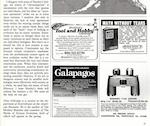
“I mention this only to illustrate the lack of total agreement even within the warring camps: things really are in an uproar these days, and each of the "basic" ways of looking at evolution has its minor variants. Sometimes it seems as though there are as many variations on each theme as there are individual biologists. But that's as it should be; this is how science is supposed to operate. ... When they [Creationists] misrepresent the exuberant, creative doubt and controversy permeating evolutionary biology these days, they are actively promoting scientific illiteracy.” |
|
Page 20:
"In fact now, after more than a century of collecting fossils, "we have even fewer examples of evolutionary transition than we had in Darwin's time," explained the Bulletin." " |
"Conflicts between Darwin and Paleontology", Field Museum of Natural History Bulletin Jan. 1979, Vol. 50 No. 1 p. 22-29.
This quote from David Raup is taken out of context, as the paper was not about the fossil record's evidence of common decent, but whether the mechanism of natural selection at the level of species is shown in the fossil record. On page 22, Raup had prefaced his comment with, "We must distinguish between the fact of evolution -- defined as change in organisms over time -- and the explanation of this change. Darwin's contribution, through his theory of natural selection, was to suggest how the evolutionary change took place. The evidence we find in the geologic record is not nearly as compatible with darwinian natural selection as we would like it to be." He goes on to state, "Now with regard to the fossil record, we certainly see change. … If we allow that natural selection works, as we almost have to do, the fossil record doesn't tell us whether it was responsible for 90 percent of the change we see or 9 percent, or .9 percent." (p.26) |
|
Page 18:
Darwin acknowledged this as a problem. For example, he wrote: "To suppose that the eye ... could have been formed by [evolution], seems, I freely confess, absurd in the highest degree." |
Charles Darwin, The Origin of Species, 1859, p. 133:
"To suppose that the eye with all its inimitable contrivances for adjusting the focus to different distances, for admitting different amounts of light, and for the correction of spherical and chromatic aberration, could have been formed by natural selection, seems, I freely confess, absurd in the highest degree. When it was first said that the sun stood still and the world turned round, the common sense of mankind declared the doctrine false; but the old saying of Vox populi, vox Dei, as every philosopher knows, cannot be trusted in science. Reason tells me, that if numerous gradations from a simple and imperfect eye to one complex and perfect can be shown to exist, each grade being useful to its possessor, as is certainly the case; if further, the eye ever varies and the variations be inherited, as is likewise certainly the case; and if such variations should be useful to any animal under changing conditions of life, then the difficulty of believing that a perfect and complex eye could be formed by natural selection, though insuperable by our imagination, should not be considered as subversive of the theory." |
|
Page 39:
"At this point a reader may begin to understand Dawkins' comment in the preface to his book: "This book should be read almost as though it were science fiction."" |
Richard Dawkins, The Selfish Gene, 1976, p.ix:
"This book should be read almost as though it were science fiction. It is designed to appeal to the imagination. But it is not science fiction: it is science. Cliché or not, "stranger than fiction" expresses exactly how I feel about the truth." |
|
Page 42:
"Richard Dickerson explains: "It is therefore hard to see how polymerization [linking together smaller molecules to form bigger ones] could have proceeded in the aqueous environment of the primitive ocean, since the presence of water favors depolymerization [breaking up big molecules into simpler ones] rather than polymerization."" |
The quote is from Scientific American, September 1978, p. 75. The purpose and content of the article goes on to address how polymerisation may have occurred. |
|
Page 89:
"Fossil hunter Donald Johanson acknowledged: "No one can be sure just what any extinct hominid looked like."" |
Donald C. Johanson and Maitland A. Edey, Lucy -- the Beginnings of Humankind, New York: Warner Books, Inc, 1981, p. 286.
"No one can be sure what any extinct hominid looked like with its skin and hair on. Sizes here are to scale, with afarensis about two feet shorter than the average human being." |
|
Page 143:
"Zoologist Richard Lewontin said that organisms "appear to have been carefully and artfully designed." He views them as "the chief evidence of a Supreme Designer." It will be useful to consider some of this evidence." This quote is a shocking twist of the writers intent and vastly changes the meaning of what Lewontin said. |
Richard C. Lewontin, "Adaptation", Scientific American, vol. 239, September 1978, p. 213:
"The manifest fit between organisms and their environment is a major outcome of evolution.... Life forms are more than simply multiple and diverse, however. Organisms fit remarkably well into the external world in which they live. They have morphologies, physiologies and behaviors that appear to have been carefully and artfully designed to enable each organism to appropriate the world around it for its own life. It was the marvelous fit of organisms to the environment, much more than the great diversity of forms, that was the chief evidence of a Supreme Designer. Darwin realized that if a naturalistic theory of evolution was to be successful, it would have to explain the apparent perfection of organisms and not simply their variation." |
|
Page 15:
"Francis Hitching, an evolutionist and author of the book The Neck of the Giraffe, stated: "For all its acceptance in the scientific world as the great unifying principle of biology, Darwinism, after a century and a quarter, is in a surprising amount of trouble."" The Bible - God's Word or Man's? p.106 describes Hitching as a "scientist" and "authority". He is also quoted in the Watchtower 1994, 1990 and Awake 1994. |
Hitching is a favourite for quotes by Creationists. The Creation book quotes his book Neck of the Giraffe 13 times. However, he has no scientific credentials, which he lies about in his book, as discussed at Hitching 12 Fe 2013). He is a paranormalist, and his book Earth Magic describes his belief in pyramid energy, astrology, ESP, dowsing and psychic research. The criticism of evolutionary theory in Neck of the Giraffe is used to advance his own theory regarding paranormal forces directing evolution. He is in no way a credible source, yet the Watchtower uses him as one of their primary sources of information in the Creation book. |
|
Pages 36-37:
"The science of mathematical probability offers striking proof that the Genesis creation account must have come from a source with knowledge of the events. The account lists 10 major stages in this order: [...] Science agrees that these stages occurred in this general order. What are the chances that the writer of Genesis just guessed this order? The same as if you picked at random the numbers 1 to 10 from a box, and drew them in consecutive order. The chances of doing this on your first try are 1 in 3,628,800! So, to say the writer just happened to list the foregoing events in the right order without getting the facts from somewhere is not realistic." |
This section of the Creation book is terrible at several levels.
First, scientists do not agree with the order of creative days in Genesis. Scientists say the source of light, the sun, was before the earth. Also, science lists the order of animal evolution as fish, reptiles, birds; not fish, birds, reptiles/animals. At least two of the days are out of order. Second, there are two creation stories in Genesis, with the order in Genesis 2 differing from the the order of creation in Genesis 1. The Creation book does not clarify which story it claims Scientists agree with, and science agrees with neither. Third, it cannot be equated to the simple probability of drawing the numbers 1 to 10 from a box. Even the simplest person would assume that the sun and earth were first. The earth is a prerequisites for containing the water, plants and animals. Light and water must precede plants, which die without them. Plants must have been created before animals, birds and fish, whom depend on plants as food. Therefore simple logic will put most of the creative days in the correct order, significantly reducing the chances of an agreement with science to well below one in over 3 million. |
For a list of all 69 misquotes visit Creation Book References or download as a PDF.
The Creation book was replaced in 2010 by The Origin of Life - Five Questions Worth Asking and Was Life Created? These are of similarly poor quality, and the document Weighed and Found Wanting shows how both misrepresent evolution and distort almost every quote included. Critique of the March 2014 Awake Article "The Untold Story of Creation" shows that the 2014 Awake is similarly dishonest.
Watchtower articles on evolution contain a consistent pattern of poor research. For instance, in 2015 both the January and August Awake! attributed the following quotation to Dawkins.
““The filament of DNA is information, a message written in a code of chemicals, one chemical for each letter,” wrote evolutionary biologist Richard Dawkins.” Awake! 2015 Aug p.5

This statement is not from Dawkins, but from Ridley. As per usual, the quote was not referenced, but a little bit of digging uncovers this statement on page 37 of Richard Dawkings book The Oxford Book of Modern Science Writing, where Dawkins is quoting from page 13 of Matt Ridley's 1999 book Genome: The Autobiography of a Species in 23 Chapters.
The Awake! January 2015 manages to be deceptive in 3 different ways within its first half page. It starts by using another famous scientist to garner misleading support for creation, quoting Rama Singh as saying "The opposition to evolution goes beyond religious fundamentalism and includes a great many people from educated sections of the population." (Awake! 2015 Jan p.3) This poorly referenced quote is from Darwin’s legacy: why biology is not physics, or why evolution has not become a common sense, (as of 2 Jan 2016). Whilst the quote is accurate, it misrepresents Singh's intention. Singh continues in the same paragraph, "There are several reasons why facts of evolution are not easily comprehensible by the general masses." He continues by explaining why educated people lack comprehension of evolution. Prompted by Singh officially complaining about Awake! using “intellectual dishonesty” when taking him out of context, see inquisitr.com, Watchtower retracted the statement, reloading an edited version of the Awake! without the reference to Singh.
Awake! 2015 Jan p.3 before and after revision.
As of 6th January 2016, the English audio version and most non-English language PDF editions still retained Singh's quote.
The second scientist quoted, Gerard, is not identified as one of Jehovah's Witnesses. Whilst only a first name is given in the English Awake!, the German issue includes his full name as being Gerard Hertel, described in his Alumni (6 Jan 2016) as being one of Jehovah's Witnesses.
The article then goes on to ask:
"Why is it that even some scientifically-minded people have trouble accepting evolution as the origin of life?"
Evolution does not study the "origin of life," research into the "origin of life" is referred to as abiogenesis. Evolution is the study of "the process by which changes in plants and animals happen over time." There is a huge amount of evidence for evolution, in fact, even Watchtower promotes a rapid form of evolution, when it claims all millions of species of animals on earth evolved from the few thousand that were able to fit on Noah's ark 4000 years ago. On the other hand, even Richard Dawkins admits we know little about the origin of life.
"We know a great deal about how evolution has worked ever since it got started, but know little more than Darwin did about how it got started in the first place. ... We have no evidence about what the first step in making life was ... We don't actually need a plausible theory of the origin of life, and we might even be a little bit anxious if a too plausible theory were to be discovered!" The Greatest Show on Earth, The Evidence for Evolution (2009) pp.416,419
Jehovah's Witnesses sadly trust Watchtower writers on matters of science, whose bias overwhelmingly affects the accuracy of the information they present. Their research skills are so fundamentally inadequate they are unable to correctly identify the source of information, let alone accurately understand and explain matters of science.
Misquoted Scriptures
The Watchtower is also known to misquote Scriptures, such as putting a full stop where there was not one, which changes the true meaning of the verse. The Watchtower concentrates on a select few Scriptures to support their doctrine and by hand picking and quoting catchy portions of Scriptures, the doctrine may seem solid, when it is not. For example, in order to support the concept of soul being non-existent at death, Reasoning From the Scriptures p.100, quotes Ecclesiastes 9:5 as:
“The living are conscious that they will die; but as for the dead, they are conscious of nothing at all.”
This is misleading, as it adds a full stop, whilst in the Scripture there is a comma. In entirety it states:
"For the living are conscious that they will die; but as for the dead, they are conscious of nothing at all, neither do they anymore have wages, because the remembrance of them has been forgotten. Also, their love and their hate and their jealousy have already perished, and they have no portion anymore to time indefinite in anything that has to be done under the sun."
Ecclesiastes is a poetic work about the vanity of life, and it is not generally taken literally. The aforementioned Scripture cannot be taken as literal, as the sentence continues with the comment that there is no remembrance of the dead. Further, it removes the resurrection hope, stating that the dead “have no portion anymore to time indefinite….” Read in full, the verse only says what the Watchtower wants it to say if they dishonestly add a full stop.
One of the most significant flaws in the New World Translation is the inclusion of the word Jehovah in the New Testament. Of the many thousands of early New Testament fragments, not a single one includes God's name. Including Jehovah means that many Scriptures have their meaning changed.
One Scripture that quite clearly refers to Jesus, Romans 10:13, is changed to Jehovah in the Watchtower Bible.
Romans 10:13 "For "everyone who calls on the name of Jehovah will be saved.""
This has an important effect, as the Watchtower attempts to use this Scripture to prove that only Jehovah's Witnesses will be saved.
"We stand now at the brink of the greatest tribulation of all, when Jehovah's storm wind will sweep wickedness from the face of this earth, clearing the way for a paradise of eternal peace. Will you be one who "calls on the name of Jehovah" in faithfulness? If so, rejoice! You have God's own promise that you will be saved.-Romans 10:13." Watchtower 1997 Dec 15 p.21
An examination of the Emphatic Diaglott, published by the Watchtower Society shows that the word used in this passage is not YHWH but Kyrios (κύριος) - Lord.
Just prior to this verse, Romans 10:9 states, "Jesus is Lord (Kurios)". It follows that Romans 10:13 refers to Jesus, and identifies Jesus as the requirement for salvation.
"Do they believe that they are the only ones who will be saved? No. Millions that have lived in centuries past and who were not Jehovah's Witnesses will come back in a resurrection and have an opportunity for life. Many now living may yet take a stand for truth and righteousness before the "great tribulation," and they will gain salvation." Jehovah's Witnesses, Who are they? What do they believe?(2002) p.29
Not content with mis-translating the Bible, the Watchtower criticises other religions that don't use the word Jehovah through deceptive quoting of their sources.
"By and large, Christendom's churches have distanced themselves from God's name. For example, the Revised Standard Version states in its preface: "The use of any proper name for the one and only God … is entirely inappropriate for the universal faith of the Christian Church." Watchtower 2013 Mar 15 p.24
"That version omitted the name, reversing the policy of the editors of the American Standard Version of 1901. Why? The preface says: “The use of any proper name for the one and only God . . . is entirely inappropriate for the universal faith of the Christian Church.” Watchtower 2015 Dec 15 p.10
What the Revised Standard Version quote says in full carries a different meaning backed by solid reasoning.
"The form "Jehovah" is of late medieval origin; it is a combination of the consonants of the Divine Name and the vowels attached to it by the Masoretes but belonging to an entirely different word. The sound of Y is represented by J and the sound of W by V, as in Latin. For two reasons the Committee has returned to the more familiar usage of the King James Version: (1) the word "Jehovah" does not accurately represent any form of the Name ever used in Hebrew; and (2) the use of any proper name for the one and only God, as though there were other gods from whom He had to be distinguished, was discontinued in Judaism before the Christian era and is entirely inappropriate for the universal faith of the Christian Church." (ncccusa.org as of 12 Mar 2016)
The Wedding Ring
The article Pagan Practices shows that Watchtower forbids a number of practices by using the line of reasoning that they are of pagan origins. It inconsistently allows Jehovah's Witnesses to use a wedding ring, despite acknowledging that it is pagan. In one instance it has included a quote that claims the wedding ring is pagan, but on other occasions removes that part of the quote, preventing followers recognising that their reasoning on pagan practices is neither consistent or logical. The full quote is:
“Indicating the non-Christian origin of many of apostate Christendom’s doctrines, ceremonies, and practices, 19th-century Roman Catholic cardinal John Henry Newman wrote in his Essay on the Development of Christian Doctrine: “The use of temples, and these dedicated to particular saints, and ornamented on occasions with branches of trees; incense, lamps, and candles; votive offerings on recovery from illness; holy water; asylums; holydays and seasons, use of calendars, processions, blessings on the fields; sacerdotal vestments, the tonsure, the ring in marriage, turning to the East, images at a later date, perhaps the ecclesiastical chant, and the Kyrie Eleison [the song “Lord, Have Mercy”], are all of pagan origin, and sanctified by their adoption into the Church.”” Revelation, It's Grand Climax p.236
Usually the part about rings is removed from this quote.
“On this point you may recall that John Henry Cardinal Newman in An Essay on the Development of Christian Doctrine gives a long list of traditional practices, including “incense, lamps, and candles; votive offerings . . . holy water; asylums; holydays . . .” and then says that they “are all of pagan origin, and sanctified by their adoption into the Church.”” Awake 1983 Aug 22 p.17
“In An Essay on the Development of Christian Doctrine, Roman Catholic John Henry Cardinal Newman admits that items Christendom has used for centuries, such as incense, candles, holy water, priestly garb, and images, “are all of pagan origin.”” Isaiah's Prophecy 1 p.152
“Back in 1878, Roman Catholic prelate John Henry Newman wrote: “Confiding then in the power of Christianity to resist the infection of evil, and to transmute the very instruments and appendages of demon-worship to an evangelical use, . . . the rulers of the Church from early times were prepared, should the occasion arise, to adopt, or imitate, or sanction the existing rites and customs of the populace, as well as the philosophy of the educated class.” Newman added that such things as holy water, sacerdotal vestments, and images were “all of pagan origin, and sanctified by their adoption into the Church.” God’s people are grateful indeed that divine teaching protects them from such apostasy.” Watchtower 1994 Feb 1 p.11
“As John Henry Newman, whom Pope Leo XIII made a cardinal, said of some of these practices: “The use of temples . . . incense, lamps, and candles; votive offerings on recovery from illness; holy water; asylums; holydays and seasons . . . images at a later date, perhaps the ecclesiastical chant, and the Kyrie Eleison, are all of pagan origin.”” Watchtower 1964 Apr 1 p.196
Rhetorical Fallacies
A rhetorical fallacy is a line of argumentation that is poorly constructed or misleading, such that the information direct a persons to an incorrect conclusion. Rhetorical Fallacies goes into detail on numerous of these that are to be found in the Watchtower. These are common in everyday conversation and written material, and often unintentional, but it is worth understanding these so as to spot them when they occur.
Unreliable Sources
Any student is aware that unreferenced information has no credibility when submitting research assignments, yet Watchtower articles regularly include quotes without providing the quote source. For example;
"One scholar puts it this way: "There is no handle on the outside of the door of the human heart. It must be opened from within."" Watchtower 2013 May 1 p.14
At an assembly in 2021 Gerrit Losch repeated the quote. In both instances, the source of the quote was not mentioned. The quote is from "The New Daily Study Bible, The Gospel of Luke" by William Barclay first printed 1953, 2001 edition page 312. Barclay was a liberal evangelical who held beliefs largely at odds with Watchtower teachings.
Watchtower makes statements about what experts believe, without any supporting quote or identification of whom those experts may be. For instance, a global flood is accepted almost universally as impossible, yet Watchtower claims:
"Similar findings have led other scientists to believe that a global flood is a distinct possibility." Watchtower 2008 Jun 1 p.8
Without any information about these scientists, such a statement is meaningless.
When Watchtower does identify the quote source, they regularly turn out to lack credibility. For example, Life - How Did It Get Here? By Evolution or by Creation? quotes Francis Hitching 13 times in an attempt to highlight flaws in evolutionary theory, referring to Hitching as a scientist, when in fact he is a paranormalist.
10% of the Brain
It is an urban legend that humans only use 10% of their brain. Watchtower claimed scientists think humans use even less of their brain than 10%, reasoning this proves human brains were designed to live forever.
"Neuroscientists say that during our present life span, we use just a small part of our potential brain power, only about 1/10,000, or 1/100 of 1 percent, according to one estimate. Think about it. Is it reasonable that we would be given a brain with such miraculous possibilities if it was never to be used fully? Is it not reasonable that humans, with the capacity for endless learning, were actually designed to live forever?" Awake! 1995 10/22 p.8
Which Neuroscientists make such a claim? The article fails to produce any. This idea is in fact an urban myth spanning back to the 1800's - see faculty.washington.edu and Ten_percent_of_brain_myth. Psychics, such as Caroline Myss and Uri Geller, have taken advantage of this myth to manipulate the gullible into believing it as a source of their powers.
A similar Watchtower quote is taken from an advocate of Eastern religion and transcendental meditation.
"In The Brain Book the author states: "Within our own heads lies one of the most complex systems in the known universe. Its power and versatility far surpass that of any man-made computer." He adds: "It is frequently stated that we use only 10 percent of our full mental potential. This, it now appears, is rather an overestimate." Watchtower 1985 Jan 15 pp.16-17
Notice that the name of the author is not mentioned, nor details of the book, other than it's title. The quote is from page 7 of The Brain Book, in the chapter "The Spearhead of Evolution", which describes the brain as the "culmination of millions of years of evolution". The author is Peter Russell, and his biography at peterrussell.com (25 Feb 2013) states, "His principal interest is the deeper, spiritual significance of the times we are passing through. He has written several books in this area - The TM Technique, The Upanishads, The Brain Book, The Global Brain Awakens, The Creative Manager, The Consciousness Revolution, Waking Up in Time, and From Science to God." This is hardly a person that the Watchtower should be quoting, as the information is incorrect, and the author has an agenda greatly at odds to the Watchtower.
The fact is 100% of the human brain is active at all times. As explained at Quora.com, fMRI images are used to show which areas are "most active" at any one time.
Not only is the 10% myth incorrect, Watchtower use of this concept to support that humans can live forever on earth is statistically naive. Even using only 0.01 percent of our brain in a lifetime would not prove we have "the capacity for endless learning." Simple maths should alert the reader that if we use 0.01% in 100 hundred years, we would be using 100% in 1,000,000 years. That is not endless capacity, it is not even a speck in the stream of time of forever, as eternity is infinitely more time that one million years.
Greber's Bible Translation
Another example has been to use Greber’s The New Testament in support of the Watchtower's New World Translation. In the 1950's, the Watchtower discussed how Greber was a spiritualist and attributed his Bible translation to communication with the spirit world.
"It comes as no surprise that the one Johannes Greber, a former Catholic clergyman, has become a spiritualist and has published the book entitled "Communication with the Spirit World: Its Laws and Its Purpose."" Watchtower 1955 Oct 1 p.603
"Says Johannes Greber in the introduction of his translation of The New Testament, copyrighted in 1937: "I myself was a Catholic priest, and until I was forty-eight years old had never as much believed in the possibility of communicating with the world of God's spirits. The day came, however, when I involuntarily took my first step toward such communication, and experienced things that shook me to the depths of my soul. … My experiences are related in a book that has appeared in both German and English and bears the title, Communication with the Spirit-World: Its Laws and Its Purpose." (Page 15, ¶ 2, 3). In keeping with his Roman Catholic extraction Greber's translation is bound with a gold-leaf cross on its still front cover. In the Foreward of his aforementioned book ex-priest Greber says: "The most significant spiritualistic book is the Bible." Under this impression Greber endeavors to make his New Testament read very spiritualistic. … Very plainly the spirits in which ex-priest Greber believes helped him in his translation." Watchtower 1956 Feb 15 pp.110-111
Despite this, Watchtower publications quoted Greber's translation during the 1960's and 1970's for support of its own translation of John 1:1, and Matthew 27:52,53, including in The Word - Who Is He According to John (1962) p.5; Watchtower 1962 Sep 15 p.554; Make Sure of all Things (1965) p.489; Aid to Bible Understanding (1971) p.1669; Watchtower 1975 Oct 15 p.640; and Watchtower 1976 Apr 15 p.231.
Finally, the Watchtower stopped referring to Greber's translation, deceptively indicating that it became aware of Greber's involvement with the spirit world due to a foreword in the 1980 edition of his Bible.
"This translation was used occasionally in support of renderings of Matthew 27:52, 53 and John 1:1, as given in the New World Translation and other authoritative Bible versions. But as indicated in a foreword to the 1980 edition of The New Testament by Johannes Greber, this translator relied on "God's Spirit World" to clarify for him how he should translate difficult passages. It is stated: "His wife, a medium of God's Spiritworld was often instrumental in conveying the correct answers from God's Messengers to Pastor Greber." The Watchtower has deemed it improper to make use of a translation that has such a close rapport with spiritism." Watchtower 1983 Apr 1 p.31
Divorce
The misuse of statistics is common in all forms of media, and the Watchtower furnishes an extreme example of how statistics can be misused. In an attempt to make Witnesses appear to have a lower divorce rate than the general population they state:
"By applying unselfish love in their marriages, Jehovah's Witnesses achieve stable relationships. In some countries one marriage out of every two or three ends in divorce. But the above-mentioned survey indicated that presently only 4.9 percent of the Witnesses are divorced or separated from their mates." Awake 1997 Sep 8 p.11
Here they make it appear the world has a 50% divorce rate, but Witnesses only have a 5% rate. In actual fact, only around 5% of people are divorced. The “percentage of marriages that end in divorce”, and “percentage of people divorced” are two very different measurements. Most studies show that the percentage of Witnesses that are divorced is very similar to that of the general population. See Divorce for a full explanation.
Earthquakes
The Watchtower has been intent on proving that the Last Days started in 1914. One way has been to present information to convince members that the signs of Jesus presence, such as earthquakes, have increased since 1914. Since this is not the case, they have resorted to presenting misleading and dishonest information about earthquakes. One ingenious method has been to quote an external source to verify that there is an increase in earthquakes.
"In the Italian journal Il Piccolo, of October 8, 1978, Geo Malagoli observed: "Our generation lives in a dangerous period of high seismic activity, as statistics show. In fact, during a period of 1,059 years (from 856 to 1914) reliable sources list only 24 major earthquakes causing 1,973,000 deaths. However, [in] recent disasters, we find that 1,600,000 persons have died in only 63 years, as a result of 43 earthquakes which occurred from 1915 to 1978. This dramatic increase further goes to emphasize another accepted fact-our generation is an unfortunate one in many ways."" Watchtower 1983 May 15 p.6 Earthquakes-A Sign of the End?
The Watchtower has withheld information, by not advising readers that the grossly inaccurate figures in Il Piccolo had been taken from its own Awake! magazine.
"Interestingly, for a period of 1,059 years (856 to 1914 C.E.), reliable sources list only 24 major earthquakes, with 1,972,952 fatalities. But compare that with the accompanying partial list citing 43 instances of earthquakes, in which 1,579,209 persons died during just the 62 years from 1915 to 1976 C.E." Awake! 1977 Feb 22 p.11
The Watchtower has also included this seemingly independent Il Piccolo quote in Life How did it get here? By Evolution or by Creation? p.225, and the Watchtower 1983 May 15 p.6.
The same Watchtower article also misquotes Professor Aki, attempting to prove a surge in the frequency of earthquakes.
"Professor Keiiti Aki of the Department of Earth and Planetary Sciences at the Massachusetts Institute of Technology speaks of "the apparent surge in intensity and frequency of major earthquakes during the last one hundred years," though stating that the period from 1500 through 1700 was as active." Watchtower 1983 May 15 p.6
This partial quote from Professor Aki gives the opposite meaning to what he actually said. Aki's full sentence was:
"The apparent surge in intensity and frequency of major earthquakes during the last one hundred years is, in all probability, due to improved recording of earthquakes and the increased vulnerability of human society to earthquake damage. The main reason is the well established plate tectonics which indicates a very steady fault motion over the past many millions of years."
Aki was explaining that earthquake activity has been consistent over millions of years, and the difference has been our ability to record earthquakes since the nineteenth century of seismometer in 1842.
Internal vs External
Most people are unable to gain a comprehensive understanding of the Watchtower religion, because information is released on a right-to-know basis. For instance, there is a soft version of the Watchtower for the public, and a far more controlling and direct study version that is used once a person has progressed to the stage of attending meetings.
Elders have a manual that outlines rules and procedures, some that are not listed elsewhere accessible by the average member. So secret is this information, that when the latest version was released, Letter to Elders, August 23, 2010 stated:
"The information is designed for use by the elders only, and other individuals should not have any opportunity to read the information."
Sisters are not allowed to even bind it under supervision, as directed in the following quote from the Letter to Elders, October 7, 2010:
"There is no objection if an elder personally spiral binds or laminates his own textbook or does so for other elders. If he has another baptized brother who is not an elder do the work for him, the elder must watch while the work is being done. Outside companies, unbelievers, or sisters are not permitted to do this work. The material in the book is confidential, and confidentiality must be preserved."
Much of the information in this book is devoted to the practice of disfellowshipping, information that a person should be made well aware of before any baptism into the religion.
Information highlighted on the Watchtower's official website is also presented in a way to appear far less offensive than the official doctrine really is. For instance, in order to justify the strict stance on shunning and disfellowshipping, the article Always Accept Jehovah's Discipline under the heading "Why Some Are Disfellowshipped" states, "Disfellowshipping takes place only if a member of the congregation unrepentantly engages in gross sin." This is misleading, since there are numerous things a Witness can be disfellowshipped for that cannot be considered a "gross" sin, such as speaking to a disfellowshipped person, smoking, or questioning Watchtower doctrine.
In the article Do You Shun Former Members of Your Religion?, the initial comment that those who no longer preach "are not shunned" is a red herring, as it is referring to a person who is inactive, not a former member as the question clearly states.
"Those who were baptized as Jehovah’s Witnesses but no longer preach to others, perhaps even drifting away from association with fellow believers, are not shunned. In fact, we reach out to them and try to rekindle their spiritual interest.
We do not automatically disfellowship someone who commits a serious sin. If, however, a baptized Witness makes a practice of breaking the Bible’s moral code and does not repent, he or she will be shunned or disfellowshipped. The Bible clearly states: “Remove the wicked man from among yourselves.”"
The second paragraph is also deceptive, as a person does not just get disfellowshipped for breaking "the Bible's moral code", but also the many Watchtower rules that are not directly outlined in the Bible, and also for disagreeing with Watchtower doctrine. Further, a person that stops their wrongdoing and repents will still be shunned for life, unless they return to the religion and are officially reinstated.
Likewise, misleading information is presented when dealing with the Watchtower's offensive doctrine on salvation. The Watchtower is clear that you must be one of Jehovah's Witnesses to be saved at Armageddon, with billions of people being mercilessly destroyed. Yet notice the ambiguous way in which a Witness is to respond when questioned if only Witnesses will be saved. It is recommended to say NO; even though the explanation shows the answer is yes.
"Do You Feel That You Are the Only People Who Will Be Saved?
No. Many millions who lived in centuries past and who weren’t Jehovah’s Witnesses will have an opportunity for salvation. The Bible explains that in God’s promised new world, “there is going to be a resurrection of both the righteous and the unrighteous.” (Acts 24:15) Additionally, many now living may yet begin to serve God, and they too will gain salvation. In any case, it’s not our job to judge who will or won’t be saved. That assignment rests squarely in Jesus’ hands."
Another misleading statement appears in an Awake! article that discusses how people should not be dissuaded from leaving their religion to join the true religion.
"No one should be forced to worship in a way that he finds unacceptable or be made to choose between his beliefs and his family." Awake! 2009 July p.29
The irony of this quote is that the Watchtower enforces one of the strictest censorships on its own members that change religion, forcing family members to shun former members for the remainder of their lives.
"Really, what your beloved family member needs to see is your resolute stance to put Jehovah above everything else - including the family bond. … Do not look for excuses to associate with a disfellowshipped family member, for example, through e-mail." Watchtower 2013 Jan 15 p.16
Happiest People
Dicto Simpliciter, or Sweeping Generalisations is a form of rhetorical fallacy. A very simple one is the following comment from the Watchtower.
""Happy is the people whose God is Jehovah!" (Ps. 144:15) Those words describe Jehovah's Witnesses as the happiest people on earth." Kingdom Ministry 2002 p.1
Though this comment appears quite regularly, there is never any evidence presented in the Watchtower to support the statement that Jehovah's witnesses are in fact the happiest people. This type of comment should cause the reader to question what the basis is for such a sweeping statement. In fact, the article Mental Issues looks at studies that have been done into the mental health of Jehovah's Witnesses, and there is every indication that rather than being the happiest people, Witnesses suffer higher levels of mental illness than the general population.
Conclusion
This article serves to show that Watchtower cannot be taken as dealing honestly, let alone providing the "pure truth" they falsely claim. Despite assurances to the contrary, each detail is not "accurate and truthful, even regarding seemingly insignificant details." (Yearbook 2011 p.13)
Watchtower warns against information that is poorly documented by unidentified and unqualified people, yet its writers are unidentified, unqualified, and rarely provide sources for their information.
"The Writing Department follows the pattern of ‘tracing all things with accuracy.’ But where can reliable information be found? While the Internet is a convenient and quick source of vast amounts of information, our researchers do not rely on blogs or poorly documented Web entries written by unidentified or unqualified persons." Yearbook 2011 p.9
Not only do errors creep in, but information is included that is specifically deceptive and misleading. As much as the Watchtower leaders encourage otherwise, each one of Jehovah's Witnesses owes it to themselves and their God to verify if the information that they are basing their life on is the truth.
"… really, would you want to be even associated with a religion that had not been honest with you?" Is This Life All There Is? p.46
Originally published Feb 2013, last update Jan 2017
![]() Paul Grundy 2005 - 2024
Paul Grundy 2005 - 2024

